#japanese nationals 2020
Explore tagged Tumblr posts
Text

Original title: Tensai Ouji no Akaji Kokka Saisei Jutsu | 天才王子の赤字国家再生術.
#tv shows#tv series#polls#the genius prince's guide to raising a nation out of debt#saito soma#rie takahashi#yanagi kohei#2020s series#japanese series#have you seen this series poll
19 notes
·
View notes
Photo
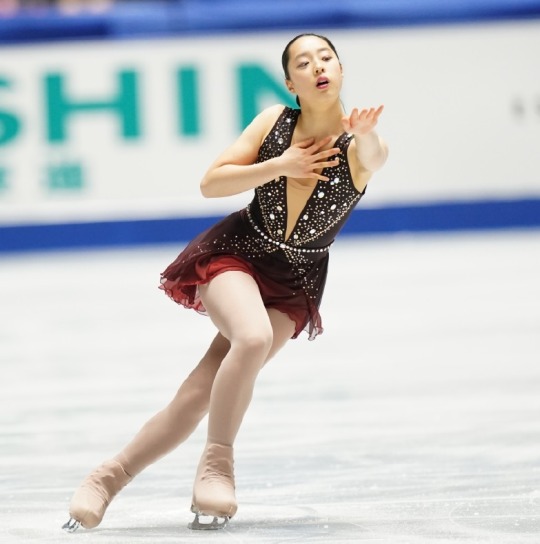
Honoka Hirotani's short program costume at the 2019 Japanese Championships.
(Source: sn_figure)
11 notes
·
View notes
Text
...
#lol I'm here to say the choir for the national anthem of the winner is pretty cool lol#yesterday they even sang in Japanese for Kaori lol#I'm also crying bc I was supposed to go to worlds in 2020 but the whole world shut down :( . This year I could not go
0 notes
Text
INTRODUCING : HYEONI ૮ ◜ᵕ◝ ྀིა
ֹ ⑅᜔ ׄ ݊ ݂ resemblance claim ۪ ֹ ᮫ wonyoung is only a part of my resemblance claim i love u wony

ֹ ⑅᜔ ׄ ݊ ݂ birthname ۪ ֹ ᮫ Kim Chaehyeon (김채현) ⤷ english name : Reese Kim ⤷ nicknames : yeoni, nini, snoopy, nemo, yeonchae, jelly/jelli ֹ ⑅᜔ ׄ ݊ ݂ stage name ۪ ֹ ᮫ Hyeoni (현이) ⑅᜔ ׄ ݊ ݂ birthdate ۪ ֹ ᮫ December 10th, 2005 ֹ ⑅᜔ ׄ ݊ ݂ nationality ۪ ֹ ᮫ Korean ֹ ⑅᜔ ׄ ݊ ݂ fluent languages ۪ ֹ ᮫ Korean (native), Japanese (fluent), English (semi fluent), Spanish (semi fluent) ֹ ⑅᜔ ׄ ݊ ݂ gender identity ۪ ֹ ᮫ girl/boy flux; non-binary ֹ ⑅᜔ ׄ ݊ ݂ pronouns ۪ ֹ ᮫ they/them

ֹ ⑅᜔ ׄ ݊ ݂ group(s) ۪ ֹ ᮫ ENHYPEN (2020-present); AngelMix (set to debut in 2025) ֹ ⑅᜔ ׄ ݊ ݂ positions ۪ ֹ ᮫ ⤷ en- : main dancer (shared w ni-ki), maknae, lyricist, choreographer ⤷ AM : leader, main vocalist, lyricist, maknae (depends on who i add since im not done scripting..) ֹ ⑅᜔ ׄ ݊ ݂ personal fandom ۪ ֹ ᮫ hyelights (hyeoni x highlights) ֹ ⑅᜔ ׄ ݊ ݂ representative emoji/animal ۪ ֹ ᮫ 🦢 (tho all of the members argue im more of a bunny) ֹ ⑅᜔ ׄ ݊ ݂ training period ۪ ֹ ᮫ 1 year, 4 months

ֹ ⑅᜔ ׄ ݊ ݂ best friends ۪ ֹ ᮫ natsuki/tsuki saito (scripted irl friend), aespa’s ningning & karina, txt’s beomgyu & taehyun, le sserafim eunchae & sakura (really all the members but yk), skz bangchan & hyunjin ֹ ⑅᜔ ׄ ݊ ݂ significant other ۪ ֹ ᮫ yang jungwon (RAAHHHHH RAHH)

ֹ ⑅᜔ ׄ ݊ ݂ fun facts ۪ ֹ ᮫ ⤷ LE SSERAFIM Chaewon's younger brother ⤷ used to train under SM & Bighit ⤷ literally the biggest BTS' Jungkook stan. literally. ⤷ ranked 2nd in the final episode of i-land ⤷ i still don't know how to write fun facts..
79 notes
·
View notes
Text

Lost | Frederick McCUBBIN 1886, oil on canvas

Dante running from the Three Beasts | William BLAKE 1827, pen, ink & watercolour over pencil & black chalk

The rabbiters | Russell DRYSDALE 1947, oil on canvas

Endormies | Rupert BUNNY 1904, oil on canvas
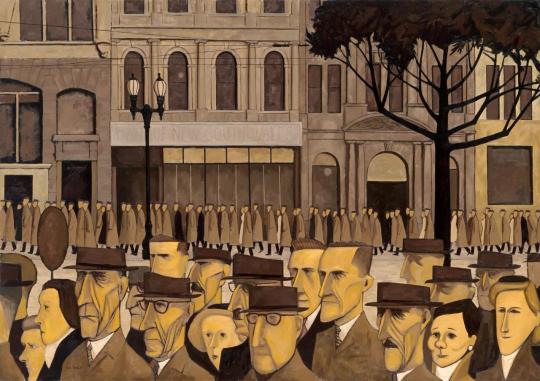
Collins St, 5p.m. | John BRACK 1955, oil on canvas
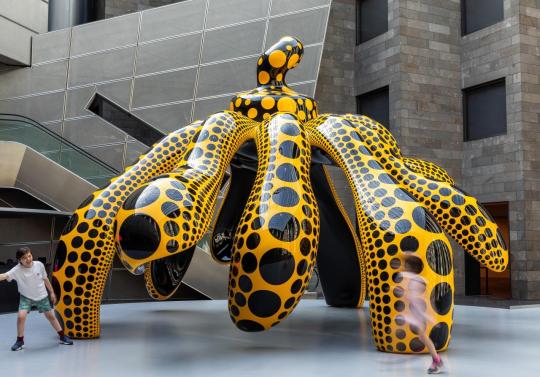
Dancing Pumpkin | Yayoi KUSAMA 2020, bronze sculpture
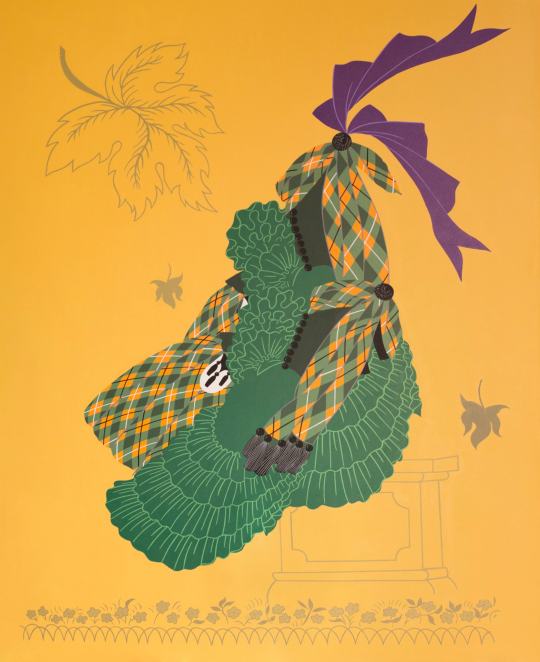
Esmeralda on the pedestal | Natalya HUGHES 2023, synthetic polymer paint on polyester

Untitled | LEE Bul 2003, polyurethane, enamel paint, stainless steel

Reflection Model (Itsukushima) | Takahiro IWASAKI 2013–14, Japanese cypress wood, bass wood, wire

Traditional hunting | David Namirlmirl MANGIRU 1952, earth pigments on Stringybark (Eucalyptus sp.)

Trilogy of the desert: Mirage | Salvador DALÍ 1946, oil on canvas
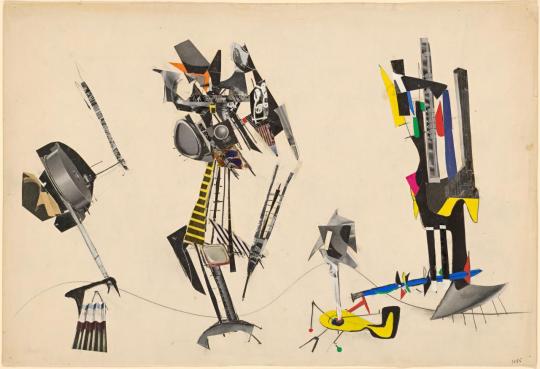
Untitled | Robert KLIPPEL 1955, collage of printed illustrations, gouache & pencil
81 notes
·
View notes
Text
Alarm bells ring in Japan as experts warn of fast-spreading new Covid variant KP. 3 - Published July 19, 2024
Paywalled at the South China Morning Post: Unpaywalled by Covidsafehotties.
The country reported a 39 per cent week-on-week surge in infections from July 1 to 7, with Okinawa the hardest hit
Japan is grappling with a new and highly contagious coronavirus variant that is fuelling the country’s 11th wave of Covid-19 infections, health experts warn. The KP. 3 variant is spreading rapidly, even among those who are vaccinated or have recovered from previous infections, according to Kazuhiro Tateda, president of the Japan Association of Infectious Diseases.
“It is, unfortunately, the nature of the virus to become more resilient and resistant each time it changes into a different form,” Tateda told This Week in Asia. “People lose their immunity quite quickly after being vaccinated, so they have little or no resistance.”
Tateda, who sits on Japan’s advisory panel formed at the start of the pandemic, said the coming weeks will be critical as authorities monitor the variant’s spread and impact.
While hospitals have reported a sharp uptick in Covid-19 admissions, Tateda said he is “relieved that not many of these cases are severe”. Typical symptoms of the KP. 3 variant include high fever, sore throat, loss of smell and taste, headaches, and fatigue.
According to the health ministry, medical facilities across Japan logged a 1.39-fold – or 39 per cent – increase in infections from July 1 to 7, compared to the previous week.
Okinawa prefecture has been the hardest hit by the new strain of the virus, with hospitals reporting an average of nearly 30 infections per days. The KP. 3 variant has accounted for more than 90 per cent of Covid-19 cases nationwide, the Fuji News Network reported, leading to renewed concerns about bed shortages at medical facilities.
Since Japan’s first detected Covid-19 case in early 2020 involving a man who returned from the Chinese city of Wuhan, East Asian nation has recorded a total of 34 million infections and around 75,000 related deaths. The country’s Covid-19 caseload peaked on August 5, 2022, when more than 253,000 people were receiving treatment.
Japan’s uptick in cases coincides with similar increases being observed globally. In the US, the Centres for Disease Control and Prevention reported a 23.5 per cent week-over-week rise in the number of people visiting hospitals with Covid-19 symptoms during the week ending July 6.
High-profile US.figures such as President Joe Biden and Doug Emhoff, husband of Vice-President Kamala Harris, have recently tested positive and gone into isolation. Meanwhile, several riders in the ongoing Tour de France cycling race have also returned positive test results.
Experts say it is too early to determine the full impact of the new variant on Japanese businesses or cross-border activities like travel. Precautionary measures are already in place at the country’s air and seaports to monitor the health of incoming arrivals. However, the global spike in cases may deter some Japanese from venturing abroad this summer.
A recent survey by Nippon Life insurance found that just 3.2 per cent of Japanese plan to travel abroad in the coming months, which is likely to depress annual travel figures once again. In 2023, Japan saw 9.62 million outbound travellers, a recovery after three years of extremely low pandemic-era numbers, but still far below the 20.01 million outbound travellers recorded in 2019.
Despite the latest surge, infectious disease expert Tateda insists there is no need for panic in Japan. However, he emphasised the importance of following precautions implemented during the pandemic’s peak, such as mask-wearing in public, handwashing, and social distancing.
Tateda also stressed that anyone testing positive should immediately isolate themselves.
#covid#mask up#pandemic#covid 19#coronavirus#wear a mask#sars cov 2#still coviding#public health#wear a respirator
208 notes
·
View notes
Text
I think the things that offend me most nowadays in like, smaller interpersonal interactions rather than grand, sweeping trends in culture, are when people chose to not partake in a wide set of things. Like musical close mindedness, or refusal to try different foods from different cultures. Not watching an entire subset of films bc they’re ‘french’. Avoiding reading bc you say you have adhd and it’s too hard. Like dude I get it, I’m busy. I can be picky. Everyone can. But the willful ignorance of closing yourself off to those VAST portions of the human experience, and not having curiosity and a lust to learn and explore art that was made by someone worlds apart from you either in terms of their culture, era, whatever. I dunno man it just pisses me off so bad. I think it’s arrogant. Like oh you’re comfortable in your safe little bubble huh? And you’re enforcing its barriers with the excuse that you’re autistic and have sensory issues. With music made by black people?? lol okay. It is pretty presumptuous for me to assume malicious intent but I think those prejudices are borne from either the comfort of being someone who’s wealthy and probably white not feeling the need to learn past what they think is enough, or it’s a reflection of a society that’s taught you to prioritize what it shills— popular, current (white, depending where you live ig) artists who are making streamlined, easy to digest content. Often when I meet people with these issues they’ll have one particular ‘niche’, and it tends to be like. 70s music. Victorian literature. Anime and Japanese games. But they’re still not really investing beyond the media presented. Like there’s so much more to Japanese culture than liking some cartoons put out between 2010-2020. You don’t gotta become some sorta Einstein who learns the background of every little freak in FGO yeah. But don’t you wanna aim higher? Aren’t you interested in any of the historical figures? And nothings wrong with hopping onto a trend. You read Dracula bc of that Dracula daily thing. Cool! Read more. Some people will say they’re chronically ill or disabled and can’t get outside. That’s okay. The internet is full of things you can read other than fanfiction, YouTube has a shit ton of free music. There’s Wikipedia and free articles online if you have questions about things. Yeah nobody is spending four hours a day looking at the national archives website and studying art history but it’s imbued in the things around you, and youll absorb it ambiently as you go along. you dont have to be a jack of all trades and cover every major genre of every major medium, but it never hurts to try! I really love seeing ppl ask too. Bc it can be kind of humiliating to admit to what seems like some jackass hipster that you’ve never delved into, idk, Serbian films (lol not that one). And hopefully if whoever you’re asking will give you honest good recommendations and not berate you. I’m kind of berate a straw man rn I guess. The hostile tone def doesn’t lend to an atmosphere of sharing but I cannot tell you how many times I’ve rbed anything involving specifically jazz only to see someone rb and add the stupidest comment on the post, or in the tags, or go into my inbox to be like waaah I don’t like jazz bc it’s boring and old and for pretentious hypocrites who hate neurodivergent people! Like what are you TALKING about. Fine if you don’t like it but don’t try and rationalize that as a moral standing you shit lark. And just as they’re allowed to dislike jazz I’m allowed to not really enjoy people who don’t like jazz. Or country. Nautical knots. Knit wear. Watching urbex YouTubers get their shit rocked by squatters. Korean food. Pachuco fashion and stupid ugly low riders. Bollywood films. and they don’t want to try any of those things either yknow? The next thing I’m getting into is circuit bending.
377 notes
·
View notes
Text
Japanese Skaters' Favorite Shoma Uno Programs and Their Reasons
This was in the Figure Skating Team Japan Fan Book for the 2024-2025 season, which had Shoma on its cover along with both a pretty substantial Shoma interview and Stephane interview about Shoma.
For Shoma's retirement, the magazine made a special column to include the active Japanese skaters (and Satoko) messages to Shoma, as well as their favorite Shoma programs. A friend helped in sharing and translating just the favorite Shoma programs part:
Sota Yamamoto: I love so many programs. Loco is the best for me because it’s unique and cool. Turandot 2.0 (2017-2018), when I had a difficult season because of my injury, this program encouraged me. Stairway To Heaven... brushing his hair upward is so cool. Great Spirit and Dancing On My Own (2019 Nationals) He graduated from Grand Prix Tokai and struggled but he could be National champion. I was so moved and almost cried. I love Bolero. Gravity and Air On The G String, he could perform not only powerful but loss of strength and I could learn from him.
Yuma Kagiyama: I love so many programs. Loco is the best. I love Great Spirit so I chose Believer last season (2022-2024 SP). I watched and watched Great Spirit on YouTube and I can skate its step sequence.
Shun Sato: Of course I love Ladies in Lavender. And Great Spirit.
Kazuki Tomono: I love Legends (2015-2016) so much because it’s first SP as a senior skater. His image as a skater changed a lot and it was impressive.
Koshiro Shimada: I love Loco at Helsinki Worlds (2017) the best. And Everything Everywhere All At Once and Bolero. At first Shoma mentioned about Bolero, “It’s so difficult and I can’t.” Finally he could do great performance and win at Worlds (2022) and it was what Stephane wanted to see I think. I was so moved and I almost got goosebumps.
Kao Miura: I love Loco the best because the balance of powerful and sensitive movements is good. I love Bolero because he seems to reach his limits. Not only jumps but each movement were so great and the last he seems to collapse because he skates so hard. I love it so much.
Nozomu Yoshioka: I love 2019-2020 season Great Spirit and Dancing On My Own. Nobody skates for such a number like Great Spirit and it’s so exciting. I like a stop before step sequence and before 3A and it’s so cool program. He struggled first half of the season so I was so moved to see Dancing On My Own at (2019) Nationals.
Tatsuya Tsuboi: I love Turandot 1.0 the best. When I was novice skater I saw his senior debut GPF (2015) and he got a bronze medal. It was so impressive and I was so moved.
Kaori Sakamoto: I love Moonlight. This season he won 4CC title. Second year 4th place, third year 3rd place, fourth year 2nd place, and finally he got gold medal. He seemed very happy on the podium and both program and costume were great. Everything was perfect.
Mone Chiba: I love the last season’s SP, Everything Everywhere All At Once, because I love the atmosphere. His step sequence expresses powerfulness and gracefulness. It’s great program so I feel it too short.
Rinka Watanabe: I love Moonlight because I’d like to express like that. His skating is like a clear (not hazy) night and it’s great.
Rion Sumiyoshi: I love many programs. I love Air On The G String because I sometimes skate it for skating lessons. It’s a very simple music but he can tell a story and he can bring a joy to audience. His technique is great.
Mai Mihara: I love many programs and each has a charm. If I choose one program, I’ll choose Turandot 2.0. Especially cantilever is really great and I was so moved and I almost got goosebumps. Both skating and expression were great.
Hana Yoshida: I have two programs in my mind. If I choose one program, I’ll choose Bolero. I forget the name… small pattern…Great Spirit? I love the step sequence and I’d like to rewatch it.
Yuna Aoki: Turandot 2.0 is so impressive because I love princely costume and I feel his powerfulness from this program. I love it so much.
Wakaba Higuchi: I love Bolero and Turandot so much. I could see Bolero at ice shows many times and it’s impressive.
Satoko Miyahara: I love Bolero the best. Turandot 2.0 is impressive. I also love gala program Padam Padam and I always think it great.
Rino Matsuike: I love Bolero. I used to skate Moonlight, so It’s so special for me. When Mihoko-sensei choreographed this program, she said “When the music started, audience was so focused on his performance from the first moment. (He could bring audience to his world.) When I am training, I think “I’d like to perform like him.”
#shoma uno#figure skating#fs#shoma uno archives#what a rich and colorful career#not tagging the other skaters to not clog their tag#but yeah ;;
143 notes
·
View notes
Note
Hi, I'm working on a theory for Ramshackle and MC. Have the creators said why Queen of Hearts/Scar/etc. were chosen for the Great Seven? ((Also, why did MC become the prefect of Ramshackle and not the Housewarden?))
Hello hello!! Thank you for this question, it became a rabbit hole!
Yana had this to say about the villains who were used for inspiration (from the game guide):
"The number one reason is that they are all from 'masterpieces with which everyone is familiar'. They are all legendary—you need only say the movie titles and the characters come immediately to mind.
Since they are also legends in their own right, we thought it would be good to choose stories with a long history, and that is how we settled on these seven.
There are many other movies with fascinating villains, so it was a very difficult decision."
-Twst Game Guide (2020)

She also goes into detail about the different eras during which the movies were set, which may also have influenced which were selected! More here! (Youtube)
But there may be more going on than we have been told 👀 There are theories that "death" is another theme that links the dorms together!
All members of the Great Seven were villains that either died in their movies (Scar, Ursula, Maleficent, Jafar (in the second movie), the Evil Queen), or were never alive in the human sense to begin with (Queen of Hearts, Hades).
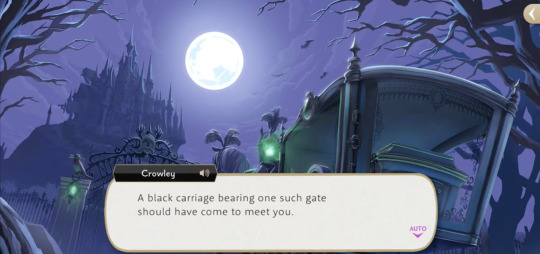
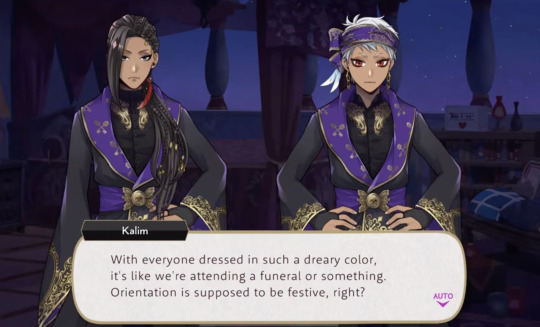
Death has never been a subtle theme in Twst, with new students at NRC arriving via coffins.
Kalim observes that, with the ceremonial robes they wear to orientation, "it's like we're attending a funeral."
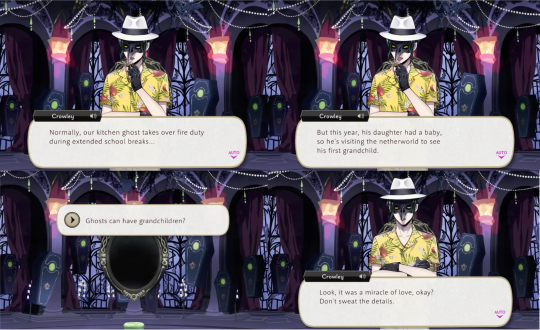

And there are also the ghosts!
While it seems possible to be born as a ghost (according to Crowley and Eliza), Lilia says that ghosts "linger here due to powerful attachments or personal motives...they aren't visible outside of magically suffused locations like Night Raven College," and that they "linger" by choice.
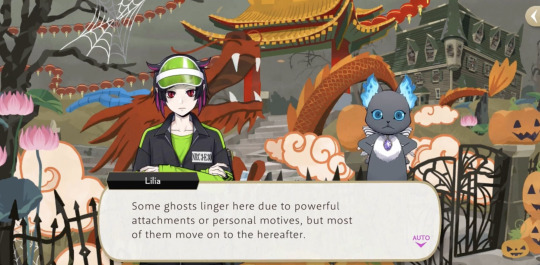
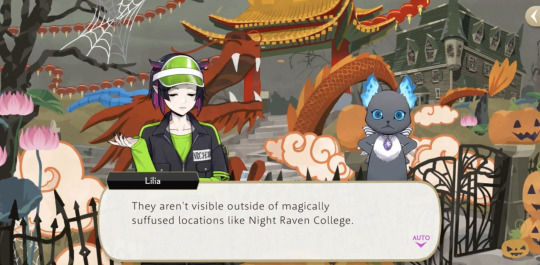
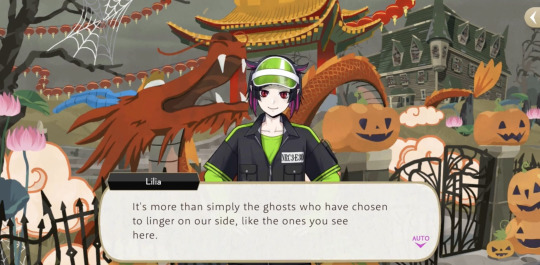
And this brings back to the prefect!
In the manga, all three prefects that we have seen thus far have had names connected to the afterlife:
・Heartslabyul Arc, Enma Yuuken (円満 雄剣): Enma's family name is pronounced the same (the kanji is different) as 閻魔 (Enma), the king of hell in Buddhism. From the Kyoto National Museum website: "The King of Buddhist Hell is Enma, who is also the judge of the afterlife."
・Savanaclaw Arc, Hirasaka Yuuka (比良坂 悠���): "Hirasaka" is written and pronounced the same as the hirasaka of Yomotsu-hira Saka, known as "The Entrance to the Underworld" in Shintoism, explained on Shimane Prefecture's official tourism website: "Yomotsu-hira Saka appears as the boundary between the land of the dead and the land of the living."
・Octavinelle Arc, Mito Yuuta (三途 宥太): "Mito" uses the same kanji as 三途川, the "River of Three Crossings," which is "a mythological river the souls of the deceased must cross by one of three crossing points." Credit to blogger Tansho for the discovery that "River Styx" was changed to 三途川 in the Japanese-language dub of the "Hercules" TV show.
So there is definitely a theme of the prefect filling a role between life and death!
While one theory is that the prefect ended up in Twisted Wonderland after they died (in the manga it is insinuated that all three prefects were hit by vehicles directly before waking up at NRC), another theory is that they're not quite dead yet.


If that is the case then they may be close (Grim wakes them up prematurely, and Crowley says that this is his first time having a student who opened their "gate" (coffin) on their own) and they might just be an astral projection of someone who is between life and death, appearing at the magically suffused location that is NRC.
In other words, a ghost 👀

The manga is following a theme of naming its characters something involving "Yuu" (which is always the students' nickname for them) and "Yuu" is also commonly adopted as the default-name for the game's prefect.
Another word that involves a "Yuu" sound is 幽霊 (Yuurei), which means: ghost :>
(Hence the name of this blog! It is the very chuunibyou name of a twitter account I made in 2018 to complain about my job. This potential connection to Twst was completely unintentional and makes me laugh.)

As for why the prefect was named Prefect of Ramshackle dorm instead of Housewarden: I am not sure! But it seems to have something to do with the unique situation that is the prefect's role.


They have not technically been assigned to the overseeing of the dorm as a whole, just to Grim, so maybe that is why? :>
And it is particularly interesting as that means that the role of Housewarden of Ramshackle Dorm is still open--maybe to be filled some day...? 👀
307 notes
·
View notes
Text

⌕ ENFiNiT MEMBERS PROFiLES .. ❞

ENFINIT ❨ 엔피니트 ❩ is a sub-unit of the group ENHYPEN, a nine-member co-ed group formed on the survival program, I-LAND. It consists of the female members of the group, Kiara and Mila. They debuted on November 30th, 2020 with the song, 'Lucid Dream', their contribution to ENHYPEN's debut EP 'BORDER:DAY ONE.’
▞ › #GROUP NAME EXPLANATION﹗▞
ENHYPEN is a mix of an en dash and a hyphen that connects different words to create new meaning, members of ENHYPEN will connect, discover each other, and grow together. ENFINITis a name that combines the en dash with infinite possibilities of the group when the come together as one. Their male counterparts, ENIVERS, is a name that combines an en dash with universe, to show that they are connected by the universe they share together, even when physically apart.
▞ › #ENHYPEN FANDOM NAME﹗▞
ENGENE ❪ 엔진 ❫
▞ › #DORM ARRANGEMENTS﹗▞
❪ 1 ❫ Kiara & Mila
❪ 2 ❫ Heeseung, Jay, Sunghoon & Ni-ki
❪ 3 ❫ Jake, Sunoo & Jungwon All of the members have their own solo rooms
𖦹 ݁ ﹐KiARA ❳ ݁ ⸒ ˚

﹟ STAGE NAME ‣ Kiara ❪ 키아라 ❫ ﹟ BIRTH NAME ‣ Kiara Park ﹟ KOREAN NAME ‣ Park Kyunghee ❪ 박경희 ❫ ﹟ CHiNESE NAME ‣ Pu Kaian ❪ 朴凯安 ❫ ﹟ POSiTION ‣ Main Rapper, Vocalist, Dancer ﹟ BIRTH PLACE ‣ Somerset, New Jersey ﹟ BIRTHDAY ‣ November 7, 2001 ﹟ ZODiAC SiGN ‣ Scorpio ﹟ CHINESE ZODiAC SiGN ‣ Snake ﹟ HEiGHT ‣ 170cm ❪ 5’6” ❫ ﹟ BLOOD TYPE ‣ AB ﹟ MBTi ‣ iSTJ ﹟ NATiONALiTY ‣ Korean-American ﹟ REPRESENTATiVE EMOJi ‣ 🦁 ﹟ SOLO FANDOM NAME ‣ Kiwis ﹟ MiC COLOUR ‣ Gold ﹟ KiARA FACTS ‣
She's the oldest child and has three younger brothers
She ranked 5th on I-Land
Despite being born in America, she grew up in Seoul, South Korea
Training Period: 5 years
She started training to become an idol at 14 and was a trainee at YG for 2 years before auditioning for BigHit
Her parents are very wealthy
She has the longest training period out of everyone in the group
Education: School of Performing Arts Seoul
She is fluent in Korean, English and Japanese
Her nicknames include 'Kiki', 'Mama Bear', 'Golden Girl' (because she was good at everything), 'Ddeonghee’, ‘Music Fairy’ (Behind the Profile Shoot)
Her favourite food is Kiwis
She doesn't like growing her hair past her shoulders
In the 'One and Only' M/V, her Pokémon partner was Umbreon
According to Kiara, Jake and Jay remind her a lot of her brothers, which is why she bickers with them the most
Her closest idol friends include ITZY's Ryujin, IVE's Yujin and Gaeul, Jeon Somi and TXT's Beomgyu
When asked what made her want to be an idol, Kiara said, "I was good at it."
Of all the members, she's the tidiest and always cleans up around the dorms
Kiara doesn't like aegyo because she thinks it doesn't suit her image
Kiara's special charm is that she looks cool no matter what she does
She can have an intimidating appearance at first, but members say that her smile is surprisingly cute
She is a producer in many of Enhypen’s discography and other groups as well, hence her nickname ‘music fairy’
She is the shortest of the group
When asked why she didn’t want to be leader, she claimed she could be very strict as it is and finds it hard to express her emotions at times, so she didn’t want her members to feel like she didn’t care for them
Her biggest inspiration as an artist is RM from BTS
Her Chinese name Kaian was given to her by Mila, and means ‘quiet victory,’ which Mila believed represented Kiara the best
Charming Point: charisma, girl crush, chic visuals, cat eyes (Behind the Profile Shoot)
Likes: cat videos, sleeping in, spas, kiwifruit, short hair, RM, BTS, Enhypen, taking morning walks, songwriting and producing (Behind the Profile Shoot)
Dislikes: aegyo, mess, swimming, vegetables, people who walk too slowly, people who manspread on public transport, wearing skirts to perform (Behind the Profile Shoot)
Motto: "Do what you can do. What you can't do, do better."
Show more Kiara facts . . .
𖦹 ݁ ﹐MiLA ❳ ݁ ⸒ ˚

﹟ STAGE NAME ‣ Mila ❪ 밀라 ❫ ﹟ BIRTH NAME ‣ Milana Bai ﹟ CHiNESE NAME ‣ Bai Minglu ❪ 王明璐 ❫ ﹟ KOREAN NAME ‣ Baek Mirae ❪ 백미래 ❫ ﹟ JAPANESE NAME ‣ Shirakawa Mitsuri ❪ 白川 光璃 ❫ ﹟ POSiTION ‣ Visual, Vocalist, Dancer ﹟ BIRTH PLACE ‣ Sunshine Coast, Australia ﹟ BIRTHDAY ‣ March 31, 2003 ﹟ ZODiAC SiGN ‣ Aries ﹟ CHINESE ZODiAC SiGN ‣ Goat ﹟ HEiGHT ‣ 173 ❪ 5’7” ❫ ﹟ BLOOD TYPE ‣ O ﹟ MBTi ‣ ENFP ﹟ NATiONALiTY ‣ Chinese-Australian ﹟ REPRESENTATiVE EMOJi ‣ 🐼 ﹟ SOLO FANDOM NAME ‣ Miluvs ﹟ MiC COLOUR ‣ Pink ﹟ MiLA FACTS ‣
She was born in Sunshine Coast, Australia but moved to Shenzhen, China when she was 9 years old
She is an only child
She comes from a wealthy family
Training Period: 2 years, 1 month
She ranked 3rd in the final episode with 1,181,289 votes
She isn't a picky eater and can eat almost anything
She did competitive cheerleading for 7 years before switching to dance after a back injury
She ran away from home to pursue her dream of being an idol because her mother didn’t approve
Her nicknames are 'Princess', 'Kirby' (because she eats anything), 'Wildcard', and 'Milana Monroe' (Behind the Profile Shoot and Self-Revised Profile)
In the ‘One and Only’ MV, her Pokémon counterpart was Jigglypuff
Her Japanese name came from the name of a character in the anime Demon Slayer, which fans claim she resembles
She was called a born star by Bang-PD because of her raw talent and fast growth rate (I-Land Ep. 1)
When her grandmother took her to get a fortune-reading, she was told she would be loved by many people
Mila's grandmother is her biggest supporter and has a shelf dedicated to her achievements
Education: Shekou International School, Hanlim Multi Arts School
She ranked 7th on TC Chandler's Most Beautiful Faces of 2020
She has a 03-liner group chat with Le Sserafim's Kazuha and ITZY's Yuna
She mentioned her closets idols friends are ITZY's Yuna, IVE's Wonyoung, Le Sserafim's Kazuha and Yunjin, and Kep1er’s Xiaoting
She is currently learning about producing music from Kiara
Kiara says that Mila and Heeseung have the most raw talent in music that she’s ever seen
Specialty: stage presence, flexibility, versatility, languages, modelling, facial expressions, ending fairy
Charming Point: Pretty smile, visuals, cute laugh, bright personality, hype-woman, starry eyes (Self-Revised Profile)
Likes: Jake (x5), Sunghoon, ENHYPEN, performing, dressing up, eating, shopping, sweets, watching dramas/anime, sleeping in, reading, working out (Self-Revised Profile)
Dislikes: Horror movies, sleeping alone/with the lights off, waking up in the middle of the night, math, sports (Self-Revised Profile)
Motto: "Live each day as if it's your last"
Show more Mila facts . . .
Related: ENFINIT Discography | ENHYPEN Members Profiles | ENIVERSE Members Profiles | ENIVERSE Discography . . .

#◌ 🌸 ˴ ℳ𝗂𝗅𝖺𝗇𝖺 ℬ𝖺𝗂 . ˚◞ ★̶̲ ꒱#enhypen extra member#enhypen oc#enhypen addition#enhypen female member#enhypen fem oc#enhypen 8th member#enhypen added member#enhypen au#enhypen scenarios
59 notes
·
View notes
Text
OFFICIAL PROFILE


ᯓ FILE 000. — LEE, NICOLE ๋࣭
⩨͢ BASIC INFORMATION ⍣
͙͘͡ ★ ◞ BIRTH NAME. nicole lee
͙͘͡ ★ ◞ KOREAN NAME. lee nakyung
⠀⠀ ⠀⠀ ⠀⠀ ⠀HANGUL. 이나경
͙͘͡ ★ ◞ ALIAS. nikki ❪ given by julie, origin from her birth name ❫⠀ ⠀collie ❪ ‘ pronounced cole-lee ’ given by belle, origin from her birth name ❫⠀ ⠀nana ❪ given by natty, origin from her korean name ❫⠀ ⠀뿌 ppu ❪ given by haneul, origin is 뿌 is a cute expression like the ‘ 😁 ’ emoji ❫⠀ ⠀naky ❪ given by daniel, origin from her korean name ❫⠀ ⠀ttokki ❪ given by fans, origin from her representative emoji ❫ ⠀ ⠀nakorita ❪ given by haneul, origin from the pokemon chikorita ❫
͙͘͡ ★ ◞ DATE OF BIRTH. april 1st, 2001
͙͘͡ ★ ◞ AGE. 23 years old
͙͘͡ ★ ◞ ZODIAC. aries
͙͘͡ ★ ◞ CHINESE ZODIAC. snake
͙͘͡ ★ ◞ PLACE OF BIRTH. toronto, canada
͙͘͡ ★ ◞ NATIONALITY. canadian
͙͘͡ ★ ◞ ETHNICITY. korean
͙͘͡ ★ ◞ RESIDENCE(S). port hope, ontario, canada ❪ 2001 — 2013 ❫⠀ ⠀chungcheongnam-do, south korea ❪ 2013 — 2015 ❫⠀ ⠀seoul, south korea ❪ 2015 — ❫
͙͘͡ ★ ◞ LANGUAGES. english ❪ fluent ❫⠀ ⠀korean ❪ near fluent ❫⠀ ⠀spanish ❪ advanced ❫⠀ ⠀japanese ❪ intermediate ❫⠀ ⠀thai ❪ beginner ❫
͙͘͡ ★ ◞ GENDER IDENTITY. cisgender female
͙͘͡ ★ ◞ PRONOUNS. she/her
͙͘͡ ★ ◞ SEXUAL ORIENTATION. bisexual
͙͘͡ ★ ◞ ROMANTIC ORIENTATION. homoromantic
͙͘͡ ★ ◞ RELATIONSHIP STATUS. single
͙͘͡ ★ ◞ HEIGHT. 163cm (5’4”)
͙͘͡ ★ ◞ WEIGHT. —
͙͘͡ ★ ◞ BLOOD TYPE. a
͙͘͡ ★ ◞ EYE. brown
͙͘͡ ★ ◞ NATURAL HAIR. black
͙͘͡ ★ ◞ BODY MODIFICATIONS. lobe piercing ❪ left and right ❫⠀ ⠀upper lobe piercing ❪ left and right ❫⠀ ⠀industrial piercing ❪ left and right ❫⠀ ⠀helix piercing ❪ left and right ❫⠀ ⠀conch piercing ❪ left and right ❫⠀ ⠀belly button piercing⠀ ⠀‘ i am the somebody ’ tattoo ❪ right rib ❫⠀ ⠀strawberry tattoo ❪ left hip ❫⠀ ⠀koi fish tattoo ❪ behind right ear ❫
͙͘͡ ★ ◞ FACE CLAIM. nana of wooah
͙͘͡ ★ ◞ SPEAKING CLAIM. nana of wooah
͙͘͡ ★ ◞ VOCAL CLAIM. juria of xg
͙͘͡ ★ ◞ DANCE CLAIM. yuna of itzy
͙͘͡ ★ ◞ RAP CLAIM. rei of ive
⩨͢ CAREER INFORMATION ⍣
͙͘͡ ★ ◞ STAGE NAME. NAKYUNG (나경)
͙͘͡ ★ ◞ COMPANY. pledis entertainment ❪ 2015 — 2022 ❫⠀ ⠀off the record entertainment ❪ 2018 — 2021 ❫⠀ ⠀axs entertainment ❪ 2019 — 2021 ❫⠀ ⠀⠀ ⠀swing entertainment ❪ 2020 — 2021 ❫⠀ ⠀s2 entertainment ❪ 2022 — ❫
͙͘͡ ★ ◞ TRAINING PERIOD. five in total ❪ skipping 2018 — 2021 ❫
͙͘͡ ★ ◞ SURVIVAL SHOWS. produce 48 ❪ 2018 ❫
͙͘͡ ★ ◞ OCCUPATION. idol
͙͘͡ ★ ◞ GROUP(S). IZ*ONE ❪ 2018 — 2021 ❫⠀ ⠀KISS OF LIFE ❪ 2023 — ❫
͙͘͡ ★ ◞ DEBUT DATE(S). october 29th, 2018 ❪ IZ*ONE ❫⠀ ⠀july 5th, 2023 ❪ KISS OF LIFE ❫
͙͘͡ ★ ◞ DEBUT AGE(S). 17 years old ❪ IZ*ONE ❫⠀ ⠀22 years old ❪ KISS OF LIFE ❫
͙͘͡ ★ ◞ DISBANDMENT DATE. april 29th, 2021 ❪ IZ*ONE ❫
͙͘͡ ★ ◞ DISBANDMENT AGE. 20 years old ❪ IZ*ONE ❫
͙͘͡ ★ ◞ POSITION(S). vocalist, sub rapper, visual ❪ IZ*ONE ❫⠀ ⠀vocalist, center ❪ KISS OF LIFE ❫
͙͘͡ ★ ◞ REPRESENTATIVE COLOR(S). WISTERIA ❪ IZ*ONE ❫⠀ purple ❪ KISS OF LIFE ❫
͙͘͡ ★ ◞ REPRESENTATIVE EMOJI(S). 🦋 butterfly ❪ IZ*ONE ❫⠀ 🐰 bunny ❪ KISS OF LIFE ❫
͙͘͡ ★ ◞ INDIVIDUAL FANDOM NAME. nakyorita ❪ origin from chikorita + nakyung ❫
͙͘͡ ★ ◞ INSTAGRAM USERNAME. nicolee ❪ public, 11.4m followers, 14 following ❫
͙͘͡ ★ ◞ DISCOGRAPHY.
⠀⠀ ⠀⠀ ⠀⠀ ⠀COLOR*IZ. october 29th, 2018
⠀⠀ ⠀⠀ ⠀⠀ ⠀Suki to Iwasetai. february 6th, 2019
⠀⠀ ⠀⠀ ⠀⠀ ⠀HEART*IZ. april 1st, 2019
⠀⠀ ⠀⠀ ⠀⠀ ⠀Buenos Aires. june 21st, 2019
⠀⠀ ⠀⠀ ⠀⠀ ⠀Vampire. september 25th, 2019
⠀⠀ ⠀⠀ ⠀⠀ ⠀BLOOM*IZ. february 17th, 2020
⠀⠀ ⠀⠀ ⠀⠀ ⠀Oneiric Diary. june 15th, 2020
⠀⠀ ⠀⠀ ⠀⠀ ⠀Thirteen. october 21st, 2020
⠀⠀ ⠀⠀ ⠀⠀ ⠀One-reeler / ACT IV. december 7th, 2020
⠀⠀ ⠀⠀ ⠀⠀ ⠀D-D-Dance. january 26th, 2021
⠀⠀ ⠀⠀ ⠀⠀ ⠀Stardust love song. march 6th, 2022
⠀⠀ ⠀⠀ ⠀⠀ ⠀KISS OF LIFE. july 5th, 2023
⠀⠀ ⠀⠀ ⠀⠀ ⠀Born to be XX. november 8th, 2023
⠀⠀ ⠀⠀ ⠀⠀ ⠀Officially Cool (with BANG YEDAM). february 9th, 2024
⠀⠀ ⠀⠀ ⠀⠀ ⠀Midas Touch. april 3rd, 2024
⠀⠀ ⠀⠀ ⠀⠀ ⠀Sixth Sense. may 25th, 2024
⠀⠀ ⠀⠀ ⠀⠀ ⠀Sticky. july 1st, 2024
͙͘͡ ★ ◞ KNOWN FOR. placing second in produce48, the ‘listener’ for the yapper best friend (julie), her duality, accidentally kissing chaewon during a live, everyone’s parents loving her more than their own kid, the switch in concept between iz*one and kiss of life, her vocals, slapping/patting her members’ butts for no reason, belle recording her crying over the finding nemo movie, being the biggest moomoo, her stable cover of bad news while drunk, openly being a ‘gleek’, affectionately being called a loser in a hot body by fans, her sanrio themed room
⩨͢ PERSONAL INFORMATION ⍣
͙͘͡ ★ ◞ MBTI TYPE. intj-a ❪ assertive architect ❫
⠀⠀ ⠀⠀ ⠀⠀ ⠀ANALYZING. an assertative architect tends to have more self confidence than a turbulent architect, particularly when handling life’s ups and downs. if things do go the way they expect, an intj-a is not likely to second guess their initial actions or experience regret.
͙͘͡ ★ ◞ POSITIVE.
⠀⠀ ⠀⠀ ⠀⠀ ⠀rational.
⠀⠀ ⠀⠀ ⠀⠀ ⠀ambitious.
⠀⠀ ⠀⠀ ⠀⠀ ⠀self-assured.
⠀⠀ ⠀⠀ ⠀⠀ ⠀adventurous.
⠀⠀ ⠀⠀ ⠀⠀ ⠀observant.
⠀⠀ ⠀⠀ ⠀⠀ ⠀efficient.
͙͘͡ ★ ◞ NEGATIVE.
⠀⠀ ⠀⠀ ⠀⠀ ⠀arrogant.
⠀⠀ ⠀⠀ ⠀⠀ ⠀impulsive.
⠀⠀ ⠀⠀ ⠀⠀ ⠀impatient.
⠀⠀ ⠀⠀ ⠀⠀ ⠀nosy.
⠀⠀ ⠀⠀ ⠀⠀ ⠀withdrawn.
⠀⠀ ⠀⠀ ⠀⠀ ⠀rigid.
͙͘͡ ★ ◞ FAMILY.
⠀⠀ ⠀⠀ ⠀⠀ ⠀joshua lee ❪ father ❫
⠀⠀ ⠀⠀ ⠀⠀ ⠀angie lee ❪ mother ❫ † ❪ 1975 — 2021 ❫
⠀⠀ ⠀⠀ ⠀⠀ ⠀daniel lee ❪ brother ❫
⠀⠀ ⠀⠀ ⠀⠀ ⠀ciara lee ❪ sister ❫
⠀⠀ ⠀⠀ ⠀⠀ ⠀kim seoyoung ❪ maternal grandmother ❫ † ❪ 1955 — 2018 ❫
⠀⠀ ⠀⠀ ⠀⠀ ⠀park hojin ❪ maternal grandfather ❫
⠀⠀ ⠀⠀ ⠀⠀ ⠀park jaewoo ❪ maternal uncle ❫
⠀⠀ ⠀⠀ ⠀⠀ ⠀park sooyoung ❪ maternal aunt ❫
⠀⠀ ⠀⠀ ⠀⠀ ⠀lee jihyuk ❪ paternal grandfather ❫ † ❪ 1950 — 1994 ❫
⠀⠀ ⠀⠀ ⠀⠀ ⠀jung yeonhee ❪ paternal grandmother ❫ † ❪ 1954 — 2011 ❫
⠀⠀ ⠀⠀ ⠀⠀ ⠀lee eunbyul ❪ paternal aunt ❫
͙͘͡ ★ ◞ HISTORY.
⠀⠀ ⠀nakyung was born on april 1st, 2001 as nicole lee in toronto, canada. she grew up in port hope, ontario, canada with her older brother, daniel, and younger sister, ciara. her mother, angie, worked as a middle school music teacher and her father, joshua, was a construction worker.
⠀⠀ ⠀she became interested in music early on, her mother teaching her how to play guitar and piano as soon as she was old enough. when nakyung wanted to be a singer “just like stevie nicks�� at eight-years-old, angie put her in vocal lessons.
⠀⠀ ⠀after being persuaded by her best friend, she joins the free ballet classes at her school with her. she starts to take dance and her vocals more seriously, finding it more fun than instruments.
⠀⠀ ⠀when she’s thirteen, her parents tell her and her siblings that her mother was diagnosed with ovarian cancer the year before. they wanted to wait to see if chemotherapy would help. angie had gotten laid off from her job, leaving joshua the only financial support.
⠀⠀ ⠀for more financial stability and emotions support, the lee family moved from canada to south korea to stay with angie’s parents. nicole didn’t even have time to say goodbye to her friends.
⠀⠀ ⠀nicole, now going by nakyung, didn’t make very much friends in her new school and kept mostly to herself. she got a job under the table as a waitress to help her parents with bills, telling her family she was at a dance studio by her school.
⠀⠀ ⠀while working, she was scouted by pledis entertainment. despite her parents thinking it was sketchy and cult-like, she auditioned and was accepted. as her brother was going to seoul national university, she moved to seoul with him to train at pledis.
⠀⠀ ⠀in 2016, nakyung’s parents announced that angie was in remission. she started working as a teacher again after becoming healthier.
⠀⠀ ⠀nakyung was in the final line-up for pledis’ upcoming girl group, but was pulled out due to ‘not being ready’. she almost left the company until her mother convinced her to stay and become better.
⠀⠀ ⠀with no news of a new pledis girl group, nakyung volunteered herself to join mnet’s survival show, produce 48. she would end up placing second in the last episode and debuting in temporary girl group, IZ*ONE, in 2018.
⠀⠀ ⠀in 2020, nakyung’s parents announced that angie’s cancer had came back— being part of the 10-20 percentage of ovarian cancer recurrence. angie would not try chemotherapy again, wanting to be with her family and go to new zealand. due to the pandemic, the family would ultimately stay in korea and not fulfill angie’s wish.
⠀⠀ ⠀in 2021, her mother dies and IZ*ONE disbands. nakyung is not seen for a long time, not even by her IZ*ONE members until her OST song for kdrama ‘twenty-five twenty-one’, stardust love song, was announced. she would, again, disappear.
⠀⠀ ⠀in 2022, it is assumed nakyung left pledis around this time as she later joins S2 entertainment after lee haein offered her a spot in ber upcoming girl group.
͙͘͡ ★ ◞ FATHER. joshua lee was born march 13th, 1973 in daegu, south korea as lee jaehyun. the day he turned eighteen, he left his house and moved to canada with his best friend and legally changed his name to joshua lee. he met angela park in 1994 and would go on to have three children with her. the first being daniel in 1997, nicole in 2001, and ciara in 2004. he doesn’t want to be in korea when they have to move but does it for his wife. when angie dies in 2021, he completely barricades himself in their room. one day, his number is changed and all of his belongings are gone. we never find out what happened to him but he either killed himself or changed his name again and started a new life. he is referred to as ‘dad’ or ‘deadbeat’. (non affectionately)
͙͘͡ ★ ◞ MOTHER. angela ‘angie’ lee was born on october 29th, 1975 in jeju, south korea as park jangmi. she goes by angela or angie now because she likes the name. she was studying abroad in canada when she met joshua. in 2012, she is diagnosed with ovarian cancer. together, they decide to bare the news on their shoulders alone and decide not to tell anyone unless chemotherapy doesn’t work. it begins to work, but it’s too expensive and she’s laid off. they have to move to seoul to be near her family for help. she hates the person she is while on chemo, and turns to god in her sickness and health, even when she’s in remission in 2016. she begins working again. in 2020, the cancer come back, but angie doesn’t want to be on chemo again. she wants to be with her family, in new zealand. but then they can’t go and she dies in korea. she is referred to as ‘mom’.
͙͘͡ ★ ◞ BROTHER. daniel lee was born on august 15th, 1997 in toronto, canada. he grew up teasing his younger sisters, ever so mean to them during puberty but there for them when they were upset. his relationship with his parents wasn’t so great, always noting a difference in the way they brought him up compared to his sisters. when he was eighteen, he left for seoul national university in 2015 with his sister. he now works as a cyber security engineer. he is referred to as ‘daniel’, ‘danny’ or ‘dumbass’. (affectionately)
͙͘͡ ★ ◞ SISTER. ciara lee was born on november 3rd, 2004 in ontario, canada. she grew up wanting to be everything like her sister, wanting to be around her constantly. she slightly grew up in nakyung’s shadow, but that didn’t matter to her— it just made her want to be her even more. she wants to become an idol just like her older sister— and she will. she currently lives with their aunt, sooyoung, and her girlfriend, bora, in busan, south korea. she is referred to as ‘chaeyoung’ or ‘cee’ or ‘ciara’.
͙͘͡ ★ ◞ MATERNAL GRANDMOTHER. park seoyoung was born on january 19th, 1955 in busan, south korea. she met lee hojin in 1972 and shortly married him a few months later the same year. they would go on to have three children, one boy, two girls. in 1996, seoyoung and hojin moved to chungnam, south korea and settled there for the rest of their lives. in 2017, her health begins to decline. in 2018, she dies in her sleep peacefully. she is referred to as ‘할머니’ (halmoni).
͙͘͡ ★ ◞ MATERNAL GRANDFATHER. park hojin was born on may 12th, 1949 in ulsan, south korea. after his father died during the korean war, his mother moved them to busan. he met seoyoung in 1972, marrying her and having three children with her. in 1996, he and seoyoung moved to chungnam. in 2001, he suffered from a heart attack. he is currently retired, but used to work as a contractor.
͙͘͡ ★ ◞ MATERNAL UNCLE. park jaewoo was born on february 21st, 1973. he is currently a businessman, living in new york.
͙͘͡ ★ ◞ MATERNAL AUNT. park sooyoung was born on september 27th, 1977. she is currently living in busan with her girlfriend, bora, and her niece, chaeyoung/ciara. she works as a hotel secretary.
͙͘͡ ★ ◞ PATERNAL GRANDFATHER. lee jihyuk was born in 1950. he was verbally and physically abusive to his son, jaehyun, which was one of the leading factors of why jaehyun left forever at eighteen. he died in 1994 of a heart attack.
͙͘͡ ★ ◞ PATERNAL GRANDMOTHER. jung yeonhee was born on july 1st, 1954. she never tried to protect her son from her husband, but joshua was soft on her and it took a lot of him to leave her behind. after jihyuk died in 1994, she tried to find jaehyun, as she knew him, but failed. she later settled in jeju, south korea in 2000 and died of a car accident in 2011.
͙͘͡ ★ ◞ PATERNAL AUNT. lee eunbyul was born on december 28th, 1981. her brother was nine years older than her and never cared enough to talk to her, despite the two having more in common than he thought. she was relieved when their brother left and then her father died. when her mother tried to look for her brother who never even wanted them, she grew angry and began to resent her mother and her brother even more.
⩨͢ TRIVIAL INFORMATION ⍣
͙͘͡ ★ ◞ HABITS & MANNERISMS.
⠀⠀ ⠀⠀ ⠀⠀ ⠀making sound effects, making sweater paws, switching from english to korean in a sentence, constantly organizing and reorganizing things, talking in aegyo, sleep talking, mumbling to herself, makes up lies about random, unimportant things for no reason, pouting or puckering her lips, sleeping in late, using ‘like’ constantly in a conversation, gesturing while talking, checking her phone, laughing in serious situations, poking haneul’s cheeks, slapping/patting her members’ butts for no reason, talking about stars, getting overstimulated with too much noise under stress, bursting into songs and choreo, being jumpy.
͙͘͡ ★ ◞ HOBBIES & SKILLS.
⠀⠀ ⠀⠀ ⠀⠀ ⠀singing, writing, playing the piano, playing the guitar, watching old and new cartoons, gardening, seeing how far she can push her members, vlogging, watching tiktoks/being on her phone, sleeping, shopping, collecting her bias’ photocards, journaling, collecting rubber ducks, doing mindf*ck games.
͙͘͡ ★ ◞ LIKES.
⠀⠀ ⠀⠀ ⠀⠀ ⠀sleeping, music, shopping, reading, strawberries, rubber ducks, learning, butter pecan ice cream, astrology, stars, science, organizing, candles, dramas, the season fall, color purple, swimming, gentle rain, night time, puzzles, talking about her mother, ice skating, museums.
͙͘͡ ★ ◞ DISLIKES.
⠀⠀ ⠀⠀ ⠀⠀ ⠀alcohol, the color orange, loud noises, hot weather, clowns, thunderstorms, liars, mint flavor, horror movies, assumptions, being vulnerable, repeating herself, being active besides dancing, chronically late people, wasting time, camping, cemeteries, family dinners, waiting, dirty fingernails, sundays, cheese, cleaning, world ending conspiracy theories/far stretched conspiracy theories.
͙͘͡ ★ ◞ PHOBIAS.
⠀⠀ ⠀⠀ ⠀⠀ ⠀heights, blood.
͙͘͡ ★ ◞ FAVORITE COLOR(S).
⠀⠀ ⠀⠀ ⠀⠀ ⠀lavender and pink.
͙͘͡ ★ ◞ FAVORITE SEASON.
⠀⠀ ⠀⠀ ⠀⠀ ⠀fall.
͙͘͡ ★ ◞ FAVORITE ANIMAL(S).
⠀⠀ ⠀⠀ ⠀⠀ ⠀bunnies, dogs.
͙͘͡ ★ ◞ FAVORITE NUMBER.
⠀⠀ ⠀⠀ ⠀⠀ ⠀seven.
͙͘͡ ★ ◞ PERSONAL PLAYLIST.
⠀⠀ ⠀⠀ ⠀⠀ ⠀anywhere but home, seulgi. gibson girl, ethel cain. rhiannon, fleetwood mac. spring day, bts. teeth, enhypen. out of the woods, taylor swift. take a bite, beabadoobee. liquid smooth, mitski. bye my neverland, kiss of life. left alone, fiona apple. black madonna, cage the elephant. you know i’m no good, amy winehouse.
͙͘͡ ★ ◞ CLOSE FRIENDS.
⠀⠀ ⠀⠀ ⠀⠀ ⠀former iz*one members. ryujin and chaeryeong, itzy. aespa. yunjin, le sserafim. miyeon and shuhua, (g)i-dle. nagyung, fromis_9. gaeul, ive. heeseung, enhypen. mark, chenle, haechan and jaemin, nct. sungchan, riize. yiren, everglow. yeonjun, txt. chuu. keeho, p1harmony. tsuki, billlie. soojin. matthew, zerobaseone. lily and haewon, nmixx. isa, stayc. park jihoon.
inspo from @m3loria
#˚ ༘ ೀ⋆。˚ ⠀⠀nakyung ⠀⠀ ☽ ⠀⠀profile.#fictional idol community#ficnetfairy#idolverse#kpop female addition#kpop addition#kpop added member#bts female member#bts female addition#idol oc#bts 8th member#kpop oc#kiss of life addition#kiss of life 5th member#kiss of life#kiof#natty#julie han#haneul#belle
71 notes
·
View notes
Text

Minyoung (ENHYPEN) Profile & Facts



Minyoung (민영) is a member of the Plus-One boy group ENHYPEN who debuted on November 30, 2020, under HYBE Entertainment.
Stage Name: Minyoung (민영) Birth Name: Park Min-Yeong (박민영) English Name: Madison Park Japanese Name: Arai Mizuki Position: Female Center, Sub-Leader, Main Dancer Birthday: December 23, 2003 Zodiac Sign: Capricorn Chinese Zodiac Sign: Sheep Height: 170 cm (5’6) Weight: N/A Blood Type: B MBTI Type: ESTJ (Her previous result was ESFJ) Nationality: Japanese Ethnicity: Korean Solo Fandom Name: Min-ions Representative Emoji: 🐰 Mic colour: Sparkly white

Minyoung Facts:
She was born in Osaka, but she studied in a Korean all-girls school rather than a Japanese one
She has two representative animals, cat because of her eyes and bunny because of her teeth. That's why she's sometimes called a 'cat-like bunny', but bunny is the more often used nickname
Minyoung's mom made her take English lessons, so she is somewhat fluent in English
She used to play for her school's badminton team and even won gold in some inter-school tournaments
She has the second shortest training period in her group, training for only 10 months excluding I-Land
Her nicknames/titles are Pradagirl because of their ambassadorship, Alive Barbie-doll because of her perfect visuals, Minnyang-ie because of her resemblance to a cat, given by her members and Maddy Hopps because of her resemblance to Judy Hopps from Zootopia, given by her fans
She is said to be someone born for the stage, because she seems her happiest when she's performing
She is very close with her sister, who came all the way to Seoul with her when she started her training (Minyoung's birthday live, 2021)
Being an ARMY since 2014, Minyoung picked BTS's RM as her biggest inspiration
She said she wants to learn how to play the drums and the guitar, if she ever has time
She used to be very popular in her school for being on the badminton team, so she always recieved chocolates from the girls in her grade on White Day
Minyoung's pet is a white ragdoll cat named Tsuki (I-Land ep. 12)
Her favorite color is white, but beige is a close second
She is known for her luck that always helps her at the right time. Her members gave her the name Golden Hands because she always picks the best option during a random draw
She has admitted that she's the worst at flirting among all the members
Sunghoon said that Minyoung likes to go out a lot and can easily make new friends, describing her as a perfect extrovert
She likes to read books in her free time and is a big fan of the Harry Potter series. She has a 3-foot bookshelf filled with novels and also has E-Book apps on her phone
Her childhood dream was to become like Tiana, who is her favorite Disney princess
She would like to try writing and composing songs for a change from her usual contribution of choreographing
Likes: sweets, Korean hot dogs, Disney, plushies, sports, the color white, Enhypen, Sunghoon (Self-Revised Profile)
Dislikes: coffee, carbonated drinks, bitter things, unorganized bed, bugs, needles, slimy things (Self-Revised Profile)
(Details as of December 2023)
Is Minyoung your Enhypen bias?

𝙗𝙖𝙘𝙠 𝙩𝙤 𓈒 𓈒 𓈒 𝗛𝗢𝗠𝗘

© 𝐌𝐈𝐍𝐇𝐘𝐏𝐄𝐍 ( 𝖺𝗅𝗅 𝗋𝗂𝗀𝗁𝗍𝗌 𝗋𝖾𝗌𝖾𝗋𝗏𝖾𝖽 ) 𝗄𝗂𝗇𝖽𝗅𝗒 𝗋𝖾𝖺𝖽 𝗍𝗁𝖾 𝗋𝗎𝗅𝖾𝗌 𝖻𝖾𝖿𝗈𝗋𝖾 𝗂𝗇𝗍𝖾𝗋𝖺𝖼𝗍𝗂𝗇𝗀
#𝐌𝗶𝗡𝗛𝗬𝗣𝗘𝗡 ◜🪽◞#enhypen#enhypen fanfiction#enhypen x oc#enhypen 8th member#enhypen added member#enhypen iland#enha#enhypen ff#jungwon#yang jungwon#jungwon x oc#riki#niki#riki x oc#niki x oc#nishimura riki
55 notes
·
View notes
Text


─── 𝑾𝐇𝐎 𝓲𝘀 𝓢𝗛𝗘 ! ⠀𓈒 ◌⠀⠀ 𓍼 ⠀𝅅⠀
STAGE NAME : eunhee BIRTH NAME : kim eunhee NICKNAMES : kpop's all-rounder, fourth gen royal princess, standard of kpop, kitty, eun, sunshine BIRTHDAY : may 17, 2004 ZODIAC SIGN : gemini BIRTH PLACE : los angeles, california NATIONALITY : korean-american FAMILY : younger brother, mom , step-dad LANGUAGES SPOKEN : english (native), korean (native), japanese (82%), spanish (60%), chinese (40%)

𝑷𝐇𝐘𝓢𝓲𝐂𝑨𝐋 ֺ ✦۫ ִ · ̮ ̮
HEIGHT : 167cm (5'7'') BLOOD TYPE : A FACE CLAIM : seulgi from red velvet VOICE CLAIM : seulgi from red velvet DANCE CLAIM : seulgi from red velvet RAP CLAIM: chiquita from babymonster

𓂃𓆩⠀⠀ ⊹𓈒⠀ 𝓟𝐄𝐑𝓢𝐎𝐍𝐀𝐋𝓲𝐓𝐘
MBTI : enfj MBTI TYPE : ENFJ personality type are often described as warm, outgoing, loyal, and sensitive. POSITIVE TRAITS : caring, social butterfly, enthusiastic, positive, open-minded, friendly, funny NEGATIVE TRAITS : too trusting, overwhelmed easily, pretty sensitive

୨୧ㅤִㅤׄ 𝓗𝓲𝐒𝐓𝑶𝑹𝓨 ⠀݃⠀ ✣ ⠀۪
STAGE NAME : eunhee AGENCY : SM ENTERTAINMENT (2017-2018) BE-LIFT ENTERTAINMENT (2018-NOW) GROUP : enhypen DEBUT DATE : 30 november 2020 POSITION(S) : lead vocalist, lead dancer INDIVIDUAL FANDOM : angels REPRESENTATIVE EMOJI : 🐱 OCCUPATION(S) : singer, dancer, model, composer, lyricist, producer TRAINING PERIOD : 4 years and 2 months SIGNATURE :
𝓣𝐑𝐈𝐕𝓲𝐀 𓈒 ♡ ۫ ۪ ⟡ ⌢ ꒱
eunhee participated in musical theater and dance in the u.s. from a young age, which gave her early exposure to performing on stage.
she taught herself how to play guitar as a teenager, often writing her own songs and performing them at small school events.
her parents divorced during her time in i-land, a difficult moment for her, but it pushed her to work even harder to achieve her dreams.
eunhee’s first acting gig was a cereal commercial when she was just 7 years old, and she still laughs about how she had to pretend to love raisins.
in i-land, eunhee was ranked second with 1,229,204 votes
eunhee is known for picking up new choreography faster than the other members, often becoming the "unofficial dance captain" during rehearsals.
eunhee is the second member of the group that has perfect pitch along side heeseung
BEHIND THE SCENES WITH EUNHEE
#⠀❪ 𝖠𝖬𝖮𝖱𝖤 𝖬𝒾𝖮 ❫ : ✶#inspo - @ivydiaries#enhypen#enhypen eunhee#enhypen female oc#enhypen masterlist#enhypen fluff#enhypen oneshots#enhypen 8th member#enhypen imagines#enhypen extra member#enhypen scenarios
92 notes
·
View notes
Text

˖ ࣪ . 🌱 ࿐ ♡ ˚ . NCT XLIGHT, pronounced as NCT BLACKLIGHT, is a seven-member fictional unit of NCT. They debuted on March 23rd, 2018 under SM ENTERTAINMENT as the fourth and only female sub-unit of the unlimited member concept group NCT. Multiple members debuted within separate units under NCT before making their debut in XLIGHT during the group's NCT 2018 EMPATHY era.
The individual members of the group faced heavy amounts of backlash when they made their original debuts in NCT, but when the first all female unit was announced in 2018, both fans and the general public were excited for the debut. Due to XLIGHT debuting during NCT 2018, they didn't see too much success with their debut song 'P!NK' despite the song being well enjoyed by the public. The girls began to gain notable traction when they had their first comeback in 2018 and became considered a monster rookie group after being nominated for multiple Rookie of the Year awards.
In the early months of 2019, SM confirmed that XLIGHT's lineup will be expanding with new members throughout the years. Since the group's debut in 2018, they have gained only three members and there are no foreseeable plans to add any more members.
Over the years, XLIGHT has been known to have their own distinct music style that sits somewhere between the style of 127 and Dream. They have been praised for having such diverse concepts each comeback but still managing to keep their unique but recognizable sound. XLIGHT is considered the most popular NCT unit in the eyes of the general public but according to the fans, the girls are the third most popular unit.
˖ ࣪ ˚ . GROUP NAME ⇁ NCT XLIGHT
˖ ࣪ ˚ . MEMBER NICKNAME ⇁ The Neos / The Xs
˖ ࣪ ˚ . FANDOM NAME ⇁ NCTzens / Lightzens
˖ ࣪ ˚ . FANDOM COLORS ⇁ #bbf604 #df0095
˖ ࣪ ˚ . COMPANY ⇁ SM Entertainment
˖ ࣪ ˚ . DEBUT DATE ⇁ March 23rd, 2018
˖ ࣪ ˚ . DEBUT SONG ⇁ P!NK
˖ ࣪ ˚ . GREETING ⇁ "To the world, this is NCT! Hello, we are NCT XLIGHT!"

˖ ࣪ . 🌱 ࿐ ♡ ˚ . MEET THE NEOS!


˖ ࣪ . 🍒 ࿐ ♡ ˚ . HEO DURI professionally known as DEDE was born in 1996 in Daegu, South Korea. She is the oldest of the group and was placed into the lineup in late 2019 after previously debuting in 127 with Regular. She made her debut in U during NCT 2020 with the release of from home. DEDE was introduced as a SM Rookie on July 17th, 2014 alongside Haechan. She was given the title of Mom of NCT by both the girls and boys due to her very motherly personality and for being the oldest female member.
˖ ࣪ ˚ . FULL NAME ⇁ Heo Duri
˖ ࣪ ˚ . BIRTHDAY ⇁ May 17th, 1996
˖ ࣪ ˚ . BIRTHPLACE ⇁ Daegu, South Korea
˖ ࣪ ˚ . POSITION ⇁ Main Vocalist, Lead Dancer, Visual
˖ ࣪ ˚ . UNITS⇁ XLIGHT, 127, U
˖ ࣪ ˚ . HEIGHT ⇁ 163cm
˖ ࣪ ˚ . ETHNICITY ⇁ Korean
˖ ࣪ ˚ . NATIONALITY ⇁ Korean
˖ ࣪ ˚ . FACECLAIM ⇁ Im Nayeon

˖ ࣪ . 🦋 ࿐ ♡ ˚ . YOSHIDA HANABI professionally known as NABI was born in 1997 in Yokohama, Japan. She is an original member of XLIGHT but didn't make her debut in NCT until the NCT 2018 Empathy era, when she debuted in U with boss. NABI was introduced as a SM Rookie on July 9th, 2015 alongside Koeun, Hina, and Herin. She was the 2nd Japanese member to debut and is highly popular over in Japan.
˖ ࣪ ˚ . FULL NAME ⇁ Hanabi Yoshida
˖ ࣪ ˚ . BIRTHDAY ⇁ April 5th, 1997
˖ ࣪ ˚ . BIRTHPLACE ⇁ Yokohama, Japan
˖ ࣪ ˚ . POSITION ⇁ Main Dancer, Lead Vocalist
˖ ࣪ ˚ . UNITS⇁ XLIGHT, U
˖ ࣪ ˚ . HEIGHT ⇁ 166cm
˖ ࣪ ˚ . ETHNICITY ⇁ Japanese
˖ ࣪ ˚ . NATIONALITY ⇁ Japanese
˖ ࣪ ˚ . FACECLAIM ⇁ Hirai Momo

˖ ࣪ . 🌤️ ࿐ ♡ ˚ . BYUN NOEUL professionally known as NOEUL was born in 1998 in Incheon, South Korea. She was the first female member to debut in NCT, turning the group into a coed group with her debut in U with the release of without u. She then made her debut in 127 with firetruck, and then became an original member of XLIGHT. NOEUL was introduced as a SM Rookie on December 9th, 2013 alongside Irene, Jaehyun, and Lami. She was given the position of leader due to her training the longest and being the group's founding member.
˖ ࣪ ˚ . FULL NAME ⇁ Byun Noeul
˖ ࣪ ˚ . BIRTHDAY ⇁ December 31st, 1998
˖ ࣪ ˚ . BIRTHPLACE ⇁ Incheon, South Korea
˖ ࣪ ˚ . POSITION ⇁ Leader, Main Vocalist, Lead Dancer
˖ ࣪ ˚ . UNITS⇁ XLIGHT, 127, U
˖ ࣪ ˚ . HEIGHT ⇁ 165cm
˖ ࣪ ˚ . ETHNICITY ⇁ Korean
˖ ࣪ ˚ . NATIONALITY ⇁ Korean
˖ ࣪ ˚ . FACECLAIM ⇁ Hwang Eunbi

˖ ࣪ . 🐼 ࿐ ♡ ˚ . AHN ISEUL professionally known as ISEUL was born in 1999 in Seoul, South Korea. She is the first added member to the lineup and made her debut in the unit in early 2019 after previously debuting in U with Yestoday. ISEUL was introduced as a SM Rookie on December 23rd, 2013 alongside Johnny, Ten, and Yuta. She also debuted as a member of project girl group Girls on Top. ISEUL is one of the group's main producers and has credits to her name for other major groups as well.
˖ ࣪ ˚ . FULL NAME ⇁ Ahn Iseul
˖ ࣪ ˚ . BIRTHDAY ⇁ September 4th, 1999
˖ ࣪ ˚ . BIRTHPLACE ⇁ Seoul, South Korea
˖ ࣪ ˚ . POSITION ⇁ Main Rapper, Lead Dancer, Vocalist
˖ ࣪ ˚ . UNITS⇁ XLIGHT, U
˖ ࣪ ˚ . HEIGHT ⇁ 162cm
˖ ࣪ ˚ . ETHNICITY ⇁ Korean
˖ ࣪ ˚ . NATIONALITY ⇁ Korean
˖ ࣪ ˚ . FACECLAIM ⇁ Ha Sooyoung

˖ ࣪ . 🐺 ࿐ ♡ ˚ . JUNG YOUNGHA professionally known as LIBBY was born in 2000 in Daegu, South Korea. She is an original member of XLIGHT and was the second female member ever announced. She made her debut in Dream and NCT with the release of chewing gum, then 127 with limitless and finally in U with boss. LIBBY was introduced as a SM Rookie on December 3rd, 2013 alongside Seulgi, Jeno, and Taeyong. She was given the nickname of Miss Neo due to her being considered the most neo female member in the group.
˖ ࣪ ˚ . FULL NAME ⇁ Jung Youngha
˖ ࣪ ˚ . BIRTHDAY ⇁ August 17th, 2000
˖ ࣪ ˚ . BIRTHPLACE ⇁ Daegu, South Korea
˖ ࣪ ˚ . POSITION ⇁ Main Rapper, Main Dancer, Vocalist, Center
˖ ࣪ ˚ . UNITS⇁ XLIGHT, Dream, 127, U
˖ ࣪ ˚ . HEIGHT ⇁ 169cm
˖ ࣪ ˚ . ETHNICITY ⇁ Korean
˖ ࣪ ˚ . NATIONALITY ⇁ Korean-American
˖ ࣪ ˚ . FACECLAIM ⇁ Hwang Yeji

˖ ࣪ . 🌸 ࿐ ♡ ˚ . ZHOU MEILI professionally known as LILI was born in 2001 in Kaohsiung, Taiwan. She was the last member to join the group and was placed into the lineup in 2021 after previously debuting in WayV with Regular. She made her debut in U during NCT 2020 with the release of 90s love. LILI was introduced as a SM Rookie on July 17th, 2018 alongside Xiaojun, Hendery, and Yangyang. She is well known as Taiwan's Flower due to her ethereal visuals and sweet personality.
˖ ࣪ ˚ . FULL NAME ⇁ Zhou Meili
˖ ࣪ ˚ . BIRTHDAY ⇁ June 30th, 2001
˖ ࣪ ˚ . BIRTHPLACE ⇁ Kaohsiung, Taiwan
˖ ࣪ ˚ . POSITION ⇁ Lead Dancer, Vocalist, Visual
˖ ࣪ ˚ . UNITS⇁ XLIGHT, WayV, U
˖ ࣪ ˚ . HEIGHT ⇁ 170cm
˖ ࣪ ˚ . ETHNICITY ⇁ Taiwanese
˖ ࣪ ˚ . NATIONALITY ⇁ Taiwanese
˖ ࣪ ˚ . FACECLAIM ⇁ Yeh Shuhua

˖ ࣪ . 🐣 ࿐ ♡ ˚ . MCKENZIE LEE professionally known as ZIE was born in 2003 in Canberra, Australia. She is an original member of XLIGHT and was the third female member ever announced. She made her debut in Dream and NCT with the release of chewing gum, then later in U with 90s love. ZIE was introduced as a SM Rookie on December 16th, 2013 alongside Mark, Hansol, and Jisung. She also debuted as a member of project girl group Girls on Top. ZIE was given the nickname of Giant Baby due to being the tallest female member but the youngest overall member.
˖ ࣪ ˚ . FULL NAME ⇁ McKenzie Minjung Lee
˖ ࣪ ˚ . BIRTHDAY ⇁ May 5th, 2003
˖ ࣪ ˚ . BIRTHPLACE ⇁ Canberra, Australia
˖ ࣪ ˚ . POSITION ⇁ Lead Rapper, Lead Dancer, Vocalist, Visual, Maknae
˖ ࣪ ˚ . UNITS⇁ XLIGHT, Dream, U
˖ ࣪ ˚ . HEIGHT ⇁ 178cm
˖ ࣪ ˚ . ETHNICITY ⇁ Korean
˖ ࣪ ˚ . NATIONALITY ⇁ Australian
˖ ࣪ ˚ . FACECLAIM ⇁ Lee Chaeyoung
layout insp. by myah! ( @venusvity )
#❪ ⋅ ◆ ⋆ — hidden under the blacklight┊❛ the neos ❜ ❫#❪ ⋅ ◆ ⋆ — hidden under the blacklight┊❛ development ❜ ❫#idol oc#idol au#fictional idol community#kpop oc#kpop au#nct addition#exo addition#fictional idol oc#kpop addition#nct!addition#idol!oc#idol!au#kpop!oc#kpop!au#oc kpop group
61 notes
·
View notes
Text

* ˚ ✦ LUNA
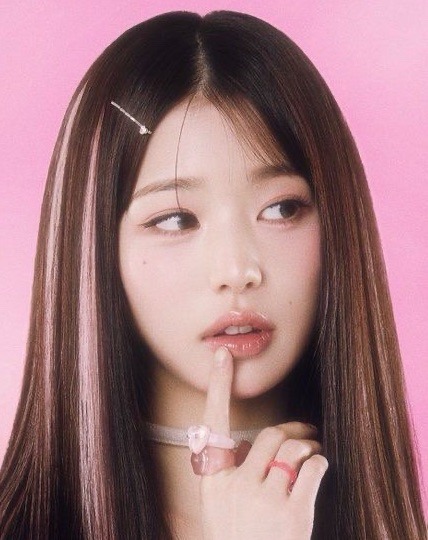
﹟STAGE NAME ‣ Luna ❨ 루나 ❩
﹟BIRTH NAME ‣ Bae Ji-Yeon ❨ 배지연 ❩
﹟ENGLISH NAME ‣ Luna Bae
﹟POSITION ‣ Lead Vocalist, Visual
﹟BIRTHPLACE ‣ Kensington, London, United Kingdom
﹟BIRTHDATE ‣ January 30, 1997
﹟ZODIAC SIGN ‣ Aquarius
﹟CHINESE ZODIAC SIGN ‣ Ox
﹟HEIGHT ‣ 170cm ❨ 5’7" ❩
﹟WEIGHT ‣ 43kg ❨ 94 lbs ❩
﹟BLOOD TYPE ‣ O+
﹟MBTI ‣ INTJ
﹟NATIONALITY ‣ Korean-English
﹟REPRESENTATIVE EMOJI ‣ 🌙
﹟SUB-GROUP ‣ Vocal Team
﹟INSTAGRAM ‣ @/lunabae
﹟SOLO FANDOM NAME ‣ Moonlights
﹟MIC COLOR ‣ Periwinkle
﹟LUNA FACTS ‣
She was born in Kensington, London, United Kingdom
She is an only child
She comes from a wealthy family
Training Period: 3 years and 4 months
She moved back to Seoul, South Korea in 2011 at the age of 14 years old and started training as an idol when she was just 15 years old back in 2012
She was a trainee at YG Entertainment for a year and was constantly offered to train at PLEDIS Entertainment which she accepted hesitantly a year later
She started training in ballet at the age of 3 years old
Her mother is a retired ballerina while her father is an anthropologist
Education: Southbank Internation School Kensington, School of Performing Arts Seoul
She can speak in English, Korean, and Japanese
Her nicknames are ‘Lulu’, ‘Nana’, ‘Ace’, and ‘Elsa’ (because she can be cold according to the members), ‘It Girl’, ‘Siren’, and ‘Bunny’
She was dubbed the ‘Ace’ by fellow trainees because she was an all-rounder who could adapt and do anything asked of her, and also because she would always get high scores during monthly evaluations
She ranked 1st on TC Chandler’s Most Beautiful Faces of 2020
She is very smart and was always top of her classes
She has a talent for manipulating situations and the rest of the members during their Going Seventeen games making her one of the scariest players
When asked what made her want to be an idol, Luna said, “I was performing on a big stage as a ballerina and there was just a voice in my head that made me want to start singing at the same time.”
Out of all the members, she's the cleanest and has an obsession with cleaning her surroundings
She has mentioned a lot of times that she dislikes doing aegyo but strangely enough, can do it naturally and unknowingly
All the members have confessed that they found her intimidating upon meeting her for the first time, idols and people who meet her for the first time have the same impression (because she has a resting bitch face)
Charming Point: Visuals, siren eyes, charisma, presence/aura, dimple, flirty personality, smirk smile, rbf
Specialty: Facial expressions, stage presence, versatility, flexibility, vocal prowess, trendsetter
Likes: Performing, dressing up, shopping, eating, baking, listening to music, sleeping, working out, reading, legos, classical music, ballet, bunnies
Dislikes: People who walk slowly, when the door gets left open, unorganized plans and surroundings, aegyo, spiders, darkness, tightly closed spaces
Motto: “I believed that I could and I did.”
Show more Luna facts. . .
Related: SEVENTEEN Discography | SEVENTEEN Members Profiles | SEVENTEEN Vocal Team Members | SEVENTEEN Hip Hop Team Members | SEVENTEEN Performance Team Members
╰ ౨ৎ LUNA-VERSE MASTERLIST

ೃ⁀➷ comment or message me to be added to the tag list :)
˚₊· ͟͟͞͞➳❥ SUBMIT A REQUEST AND ASK ME ANYTHING!
: ̗̀➛ requests are always open ♡ - lunaఌ

Taglist: @yeoberryx @minminghao @angie-x3
#seventeen 14th member#⋆ ˚。⋆🌙˚LUNA-VERSE#seventeen#svt#svt x reader#svt imagines#seventeen x reader#scoups#jeonghan#jeonghan x reader#jeonghan x you#jeonghan x y/n#jeonghan x oc#yoon jeonghan#yoon jeonghan x reader#yoon jeonghan x you#joshua hong#seungkwan#dk#woozi#vernon#mingyu#mingyu x reader#wonwoo#wonwoo x reader#hoshi#the8#jun#svt dino#svt fanfic
136 notes
·
View notes
Text
The Floating Causation of Vulgar Anti-Racism
Post for August 12, 2024 ~7,400 words, 36 minutes
-★-
The late 20th century and the early 21st century were an excellent time for 'catch-up' development in under-developed countries. For example, the GDP per capita of the People's Republic of China rose from $312 in 1980, to $12,720 in 2022, more than a 40x increase. This is despite the People's Republic being nominally communist, 92% Han Chinese, and one of the largest potential geopolitical rivals to the United States. This is not a one-off – exports from the Socialist Republic of Vietnam to the United States rose from $50 million in 1994 to $114 billion in 2023.
While the ideologically liberal government of the United States did invade Iraq and Afghanistan, and placed strict limits on Iran, in practical terms, the United States was willing to direct hundreds of billions of dollars of demand, for everything from disposable gloves to rice cookers, to countries that were neither majority white nor, officially, capitalist, which allowed these countries to build up their industrial base.
Inside the United States, as of the early 2020s, Americans of Indian descent, Americans of Asian descent, and a number of other non-white groups are outperforming the median household income of white Americans. It's not uncommon to see an Indian-American as the CEO of a major US corporation, such as Microsoft's Satya Nadella, Google's Sundar Pichai, or IBM's Arvind Krishna. And while Americans of Nigerian descent aren't earning quite as much money as Sundar Pichai, they are doing better than the U.S. national average. [1]
The American economy is willing to award non-white Americans and non-white immigrants with average pay higher than that the average pay for white Americans, and American society is willing to award members of these same groups with highly prestigious positions – Google is one of the most famous American companies, and to be its CEO is highly prestigious indeed.
Why is it that vulgar anti-racists aren't content to leave well enough alone on negative racial messaging, and take advantage of this opportunity to focus on personal development, ingroup development, and national development? Why is it that they have a strange totalitarian bent, such as Ibram Kendi proposing to give veto power over all government policy to a body of unappointed race experts, which would de facto end democracy?
Last month, @max1461 wrote a post, attempting to find a balanced compromise between the social justice movement and its critics in the discourses on racism over the past 10 years. Perhaps this was intended to close the books and allow the participants to move to a saner footing going forward. Subsequently, Max flagged the post as unrebloggable in order to prevent it from being beat up like a piñata. Near the end of the initial chain, Max wrote:
I can’t stress enough that, for all the excesses of DEI seminars and modern anti-racist academia and whatnot, for however unhelpful or even regressive these things may often be, what they exist in response to is fundamentally a horror of an entirely different and incomparable scale; something unspeakably evil and destructive. And, after 200 years of such an evil world order, which only really began to melt in 1945, I think it would be incredibly naive to believe that all the wounds are now healed.
It would seem that for the most part, the wounds that Japan suffered from America in World War II have already healed. The country already went through reindustrialization, followed by a boom period (which startled Westerners), and then a subsequent crash and the 'lost decade' of the 1990s. The Japanese have a favorable view of the United States, as perhaps they should – Japan has prospered in the Post-WW2 international order, in which they can simply purchase whatever materials they need on global markets with no need to invade or occupy anyone.
Yet for others, the past lingers on.
Ibram Kendi is one of the most famous contemporary self-identified anti-racists, a New York Times bestselling author (his most famous book was titled "How to Be an Anti-Racist") who was not only platformed by major corporations such as Microsoft (in 2020, an advertisement on the login screen of Windows 10 computers linked to a search for "anti-racism books," with his at the top), but even received funding for his own anti-racism center (now under attack for its ineffectiveness).
At one time, Ibram Kendi thought that white people were aliens. A roommate talked him out of it, asking how it was that white people could have children with everyone else if that were the case. To his credit, Kendi did change his mind.
...but how could anyone have come up with Kendi's conclusion in the first place?
In school in the United States, children are taught that the Spanish conquered the Aztecs. It is true that Spanish military forces brought about the downfall of the Aztec Empire, but often people forget the details of what they learned in school, and often what they learn in school is itself a simplified story, designed to be told to children. Encyclopedia Britannica's summary of the Battle of Tenochtitlan largely agrees with the gist of Wikipedia's more detailed article on the Fall of Tenochtitlan, which is littered with instances of "[citation needed]."
Wikipedia, however, provides more numbers. In particular, Wikipedia's version provides one of the Internet's favorite parts of wiki battle articles, a listing of the balance of opposed forces (with citations):

There is a racist narrative of the conquest of the Americas in which the brave Spanish explorers overcame the savage, human-sacrificing hordes of the Aztecs. There is an inverted, anti-racist narrative of the conquest of the Americas in which the powerful, cruel Spanish showed up to oppress the weak, innocent Aztecs.
And then there is a third narrative - a narrative that politics happened. A number of tributary states had grievances with the Aztecs, and the small number of Spanish probably didn't seem like enough to conquer the whole territory from the perspective of the tributaries, but did seem powerful enough to rally around to fight the Aztecs and win.
Nobody comes out looking good in this third narrative. The Spanish brought about a brutal war with tens of thousands of casualties, and devastating disease followed their arrival. The Aztecs and tributaries combined failed to overcome a foreign invasion due to (relative to the foreigners being from another continent) local infighting. The Aztecs were awful enough that a number of tributaries sided with an army of foreigners against them.
Now, suppose that we delete the 200,000 native allies from the balance of forces above, but still record a victory for the Spanish. The effect of the native allies remains, but the cause of that effect disappears. This creates an effect without a cause – unattributed causation, which is disconnected from what came before, or what we might call, "floating causation."
Some might call overcoming a force of 80,000 with only 1,000 or so men a miracle. For those not so inclined, the 'floating' causation gets attributed to the Spanish soldiers – their equipment, their valor, their tactics, and their discipline. Each of a thousand Spanish infantrymen is now somehow worth 200 native warriors.
In this cartoon version of history, the Spanish are an unstoppable psychic warrior race. Their steadfast will in the face of danger and their unit cohesion are quite nearly inhuman, and their technological advantage is overwhelming. The natives have not merely made a political miscalculation similar to others of the pre-modern era, such as the decisions of states facing Genghis Khan, but are buffoons to the slaughter, incapable of putting up any real defense.
In this cartoon, the Spanish can go anywhere. They can do anything. And because of this, they are the only people with agency in the whole world.
They sound... like aliens.
Trying to rebalance this cartoon only leads to greater absurdities, such as the idea that only Europeans ever meaningfully engaged in conquest (contradicted by Genghis Khan), or that industrial technology and its resulting pollution are "European" in nature (China has been quite aggressive about industrializing), or that only "European" countries waged modern and industrialized wars of conquest (the Empire of Japan used guns, bombs, and tanks as part of its project to create the Greater East Asia Co-Prosperity Sphere).
All three of the above counter-examples are from Asia, which is usually conspicuously absent from self-identified anti-racist thinking, but none of them are obscure.
-★-
It is my belief that floating causation is a source of distortions across the ideological spectrum.
Ideology is not independent from human beings. Manifestos, one might say, do not print themselves. From the other direction, it is not a piece of paper which murders somebody – it is a human being who pulls the trigger.
There is ideology, which is a system of related rules and beliefs, and there are adherents who adopt ideology, spread beliefs, and put ideological rules into practice.
An ideology can contain taboos which prohibit noticing or explaining the true cause of some outcome, separating the cause from its effect. Practitioners can then attribute that effect to a preferred ideological construct instead, making it seem much more powerful, and often dangerous, than it really is.
The Elephants
Imagine (as this example is entirely made-up) that there is some village in which elephants are considered sacred, but the elephants in the area have a habit of trampling crops in the night. To avoid loss of face, the damage to crops is attributed to "bandits" by an initial group of elders. The young children who do not know better are then taught this explanation. Later, after the death of the elders, the initial truth is lost. Anyone claiming to have seen elephants trampling the fields is denounced as choosing the vile bandits over the virtuous elephants. An outsider who did not realize what was happening might be quite impressed to hear that a bandit in the region ruined a dozen fields in a single night, and assume that the bandit has tremendous physical stamina.
But floating causation is not necessarily the result of an ideological taboo. Someone may be ignorant about the cause of an effect, unable to understand the process by which an effect came about, have powerful emotions about the topic which they are unwilling to confront or may not even be aware of, or may simply have poor judgment. An adherent may be drawn to an ideology for these reasons.
Continuing with our example, a fresh-off-the-boat colonial administrator arriving at the village might be unaware that elephants exist, or trample crops, and conclude that there were ongoing feuds driven by animosity among the villagers, with bandits as the cover-story. Alternatively, the new colonial administrator might love the elephants and hate the villagers, and be unwilling to consider the possibility that the elephants are trampling the crops, including cooking up rather elaborate rationalizations.
Ideology
Issues with not understanding a process are more likely to come up with things like economics – occasionally a worker will post a video to social media complaining that he is not paid the full value of the items he sells or creates, ignoring all the money that went into the construction of the facility, the work from other workers putting together the input materials, and so on.
Liberals in the late 00s and early 2010s had an interest in memetics, which concerns the replication and spread of ideas. (This field is where the term "Internet meme" comes from.) Then, as now, they had a tendency to treat people as too similar to each other, and some of them leaned towards the idea that any person could hold any ideology. Ideologies do (in my judgment) influence behavior – there are far fewer monarchists around these days, and far fewer monarchs with real power, for example – but how a set of beliefs is expressed depend on the emotions, motives, and temperament of the person who holds those beliefs.
So do people choose ideologies, or do ideologies choose people?
One way to view this matter is as a cycle. Someone's social environment is partly a matter of choice, and partly a matter of circumstance. The ideologies that show up in someone's environment are generally going to be ones that spread (as ideologies that don't attract new adherents will die out), but which ideology someone actually chooses and how they practice it will be influenced by what type of person they are.
Another way to view this matter is that emotions, motives, temperament, and beliefs are all things that make certain actions or thoughts either easier (and cheaper) or more difficult (and more expensive). A drug addict who believes in hard work and free market capitalism, but finds himself stealing to feed his habit, may find that the influence of his beliefs is not enough to overcome his addiction. (He is likely to feel miserable.) However, when a religious person is choosing what time of day, or day of the week, to worship, the explicit belief of their religion is likely to have a great deal of influence.
Yet another way to view this matter is to treat things like social relations, ideology, and temperament as interacting layers, and then propose that politics spans multiple layers.
Human Talent
I don't believe that all human beings are equally talented, and I don't believe that they all have identical temperaments. Therefore, one of my beliefs is what might be called the "human capital theory of movements." Ideologies consist of networks of related beliefs which can be used to interpret the world, to guide behavior, or to create arguments. But ideologies do not create beliefs or arguments themselves. Humans do.
When a movement has a lot of talented, virtuous people working for it, these people can create new arguments in order to win debates, and change parts of the ideology, the network of beliefs, to adapt the network to changes in conditions. Without talented people, the ideology of a movement will drift farther from environmental conditions, causing its responses to become more misaligned with conditions on the ground.
Talented people are also needed for the implementation of an ideology. An ideological book is just an inert text. No matter how complex it may be, it is fundamentally limited in its complexity. Applying that text in the environment, bridging the gap between what the text says and what that means in the reality of a specific situation, requires both intelligence and good judgment. Not every person is equally talented, and not every person is equally informed. If someone more talented and with better judgment is around, they can read the situation and come up with some simpler rules or orders for others to follow.
The less talented the adherents of a movement are, the lower the ability of the movement to adapt to conditions over both the short-term and the long-term.
A shift in the distribution of talent can precede other forms of political change. Ideologues may smile as the most disagreeable members are driven out of their movement, but at the same time, the lack of criticism will reduce the movement's ability to respond to change.
There are trade-offs. The use of floating causation may make an ideology less aligned with reality, but it may also be useful for the movement to stoke the emotions of their followers in order to drive action. (This emotional motivation bit is why every election in the United States is "the most important in your lifetime.")
-★-
Beliefs are not intelligence. Nonetheless, a person with a belief may act as though they are smarter (or even wiser) than they actually are. This is just the nature of knowledge (as cached intelligence, wisdom, and observation).
I developed the talent theory in the prior section by observing opposition to racism in the United States prior to 2014. In the United States between 2000 and 2014, there was substantial support for individualist "colorblindness," while at the same time, there was immense social pressure against overt white racial organizing.
Racial organizing takes time and effort. Because white Americans were not subject to racial discrimination, they could simply go out into the market and earn what their work was worth. For talented white Americans, the gains from white racial organizing would be marginal, so the penalties could easily overcome those gains. The less talented would have the most to gain due to the ability to reduce the amount of economic competition they would be up against, but they were also less able to organize. [2]
There was somewhere famous for white racial organizing in the US during this era: prisons.
Racial prison gangs have been particularly noted in the California prison system. Prison gangs offer inmates a credible threat of retaliation if the inmate is harmed, so every inmate has an incentive to join one, and the bigger the gang the better that threat of retaliation is, so every gang has an incentive to recruit. If you're a gang member and a new guy comes in and starts causing trouble, and you don't want to escalate (and thus risk extra charges for your guys or reduced privileges), what are you to do? You would prefer to negotiate with someone that has leverage on him. Race is very visible, even if inmates move around between prisons, so if all inmates get sorted into gangs by race, then someone is responsible for this guy, and by talking to the right people, you can make sure he knows it. (If the troublemaker still doesn't respond, and his own gang cut him loose, then you can punish him without fear of retaliation from other inmates.)
Different incentives produce different results.
Four Options
Glenn Loury is a black man, and an economist at Brown University. He views himself as an American and therefore an inheritor of human rights philosophy of the American founders and their English forebears. He has his own show on YouTube in which he regularly discusses matters with John McWhorter, another black man, who is a linguistics professor at Columbia University. (John strikes me as more liberal, and I heard that he was frightened of Donald Trump, a sentiment shared by many white American culturally liberal Democrats.) Both of these men are quite smart, and if you watch the show, you'll see them easily consider arguments from various perspectives and toss hypotheticals back and forth.
Neither of these men are vulgar anti-racists.
Roland Fryer is a black man, and is an economist at Harvard (although he was suspended for 2 years) who I have discussed previously. He thinks like an economist, and has conducted studies such as paying children to read books. In previous appearances, it seemed that he believes that education gaps can be closed through extremely rigorous selection of teachers and other methods.
Mr. Fryer does not appear to be a vulgar anti-racist.
These men are all relatively prominent voices. If you go looking for the sort of content they produce, they aren't that hard to find. And they're all smart. They might have disagreements with each other and with some of my readers, but smart people can disagree.
However, during the 2014-2022 era, when it was decided to push a black academic to prominence, political forces settled on Ibram Kendi instead. There must have been dozens of other candidates.
When I think about why that happened, I suspect that the answer is that while the first three men care about the interests of black Americans, all three of them are willing to say, "No." Although I doubt they would phrase it in exactly these terms, I suspect that all three understand human rights as rooted in high-order consequences, limits on information, and human bias.
If you proposed to John McWhorter that we should give veto power to a committee of unelected race experts, he would immediately recognize the problem with just that.
Why Vulgar Anti-Racism?
With all of that said, I believe we can think about vulgar anti-racism by means of comparison.
a. Economics
Loury and Fryer are both economists. They know about gains from trade, prices as a distributed form of economic planning, property rights as enabling investment, specialization of labor, economies of scale, and dozens of other things. They understand where wealth comes from.
The typical vulgar anti-racist that you will encounter on an Internet discussion board has little knowledge of economics, and tends to think of total production as fixed. From their perspective, if someone has more resources than another person, it has nothing to do with production, and is purely the result of hoarding.
The typical vulgar anti-racist also doesn't think in terms of entropy, the tendency of things to break down over time. They tend not to discount temporally-distant advantages. (If a well was built 400 years ago, they treat that advantage as retained today.) They tend to think of capital as fixed and not as something that is constantly being rebuilt and adjusted. They don't understand that the ability to create new capital is generally more important than the initial capital in the long-run.
Thinking about production is probably why we see Fryer focused on educational gains. His theory is likely that if the children have a good base of education, they'll be able to produce more, avoid losses, overcome entropy, and net accumulate wealth. If they don't have a good base of education, then they'll be less productive, and entropy will eat a higher percentage of their earnings, leading to reduced wealth.
If someone doesn't know economics, then the wealth of developed countries is "unexplained," and so are the motives of many people within developed countries.
b. History
I don't know about Fryer specifically, but Loury and McWhorter seem to have a good grasp of history.
A solid understanding of history leads to seeing actions as emerging from their historical contexts. This places a limit on the range of expected behavior.
For example, for most of history up until about the 1900s, the child mortality rate was about 50%. That example is relevant for feminism, as under such brutal conditions, we would expect any society that didn't push for women to have at least 4 children to die out. Gender-based oppression didn't occur for no reason, or because of pure male greed, but was influenced by material circumstances.
If we run this understanding backwards, it follows that 1700s or earlier gender norms would be unlikely to return without 1700s or earlier child mortality rates.
Likewise, some basic historical knowledge would reveal that wars of conquest have happened pretty much everywhere, so it's quite unlikely that Europeans are uniquely conquerors. You end up having to declare everything from feuding Chinese kingdoms, to the Māori, to chimpanzees, be "European" in order to fit the model.
The typical vulgar anti-racist's position is, implicitly, "Everyone lived together in peace and harmony, until one day, for no reason at all, the Europeans became possessed by the spirit of greed, and attacked."
If someone somehow doesn't know that war existed outside of Europe prior to 1492, then the wars of colonialism are "unexplained," and so are the motives of the people who fought them.
When vulgar anti-racists do research history, they generally focus on collecting racial grievances in order to build up a case that the group they favor are poor, oppressed, not responsible for anything bad their group has ever done, and are owed indefinite benefits for incalculable harms. They don't proceed from the idea of, "How does this work?" They don't, say, look at the tremendous economic success of South Korea, and ask, "Based on how South Korea obtained their wealth, how can our group achieve such riches?" (They don't even look at South Korea's birthrate and ask how they can avoid such a fate!)
Even before World War 2, Japan did look afar to ask how they could become rich. That kind of mentality is part of how they were able to become a developed country (who could threaten other people with tanks) in the first place.
Looking to Asia is useful for people making comparisons to figure out how things work, but is not useful for collecting racial grievances in order to build up racial claims to make demands. That's why vulgar anti-racists often don't know basic facts about Asian history, like that state testing to determine government positions was practiced in ancient China. [3]
c. Racial Attachment
Even during the individualist colorblindness of 2000-2014, there were still white Americans with some talent engaged in racial organizing. In general, these were people to whom race was very important, and thus who were out-of-step with the mainstream of white America.
It's my opinion that there is a natural range of tribalism among human beings. Sometimes, the rival tribe on the other side of the mountain just want to trade. Other times, they really are out to kill you. The trait doesn't disappear, because wars still happen, and even if they didn't happen, someone could just reinvent war and start it all back up again.
In my view, this tribalism trait isn't attached to race specifically. It can attach to religion. It can attach to sex. Some of the rhetoric from radical feminists sounds the same as rhetoric from hardcore ethnic nationalists – or at least it would, if we treated men as an ethnicity. In our modern environment in which race is highly legible due to intercontinental travel, for a lot of people, it gets attached to race.
Rather than assigning people a single number on a scale from "moral" to "immoral," it's probably better to think of people as having virtues and vices, strengths and weaknesses.
Some level of racial attachment itself is not inherently evil. Based on his research topics, for example, Roland Fryer seems interested in bringing about the success of people with a similar background to himself. His virtue (his interest in truth) and his strength (his intelligence) convert that attachment into something that's beneficial to society.
High levels of racial attachment fly much closer to the wire. A highly racially attached individual might do good work in other domains, but there's a risk that they'll end up routing too much of their sense of self-worth through their race, and become obsessed with guarding their race's self-perceived reputation. For such a person, any information deemed unflattering to the group may be interpreted as an attack on himself (or herself).
The Mayo Clinic (a network of hospitals in the United States) describes narcissism as:
Narcissistic personality disorder is a mental health condition in which people have an unreasonably high sense of their own importance. They need and seek too much attention and want people to admire them. People with this disorder may lack the ability to understand or care about the feelings of others. But behind this mask of extreme confidence, they are not sure of their self-worth and are easily upset by the slightest criticism.
A number of users on Twitter (now known as X.com) began using the term "ethnic narcissism" to describe this sort of disordered thinking when done on behalf of a racial or ethnic group rather than oneself specifically.
2019 and 2020 were banner years for platforming this sort of behavior, with the nation's leading newspaper arguing, in its own words, that we should make the suffering of a particular racial group the core narrative of American history, that everyone should define their identities around:
The 1619 Project is a major initiative from The New York Times observing the 400th anniversary of the beginning of American slavery. It aims to reframe the country’s history, understanding 1619 as our true founding, and placing the consequences of slavery and the contributions of black Americans at the very center of our national narrative.
Obsession with self-perceived ethnic reputation is part of what leads to the "rebalancing the cartoon" behavior I discussed earlier:
Trying to rebalance this cartoon only leads to greater absurdities, such as the idea that only Europeans ever meaningfully engaged in conquest (contradicted by Genghis Khan), or that industrial technology and its resulting pollution are "European" in nature (China has been quite aggressive about industrializing), or that only "European" countries waged modern and industrialized wars of conquest (the Empire of Japan used guns, bombs, and tanks as part of its project to create the Greater East Asia Co-Prosperity Sphere).
How does someone end up so ignorant that they don't know that Genghis Khan existed? By being the kind of person that doesn't want to know that Genghis Khan existed. They don't look it up. If you tell them, they either forget or they take a conflict theorist approach and think that it's some sort of trick.
Unfortunately, while a fairly accurate description of the behavior at issue, the term "ethnic narcissism" can also be used as an attack by ethnic narcissists themselves, as well as people engaged in ethnic conflict. This makes it of limited utility in practice.
The Mysterious Anglo
Option #1: In general, the right wing would consider the vulgar anti-racists to be liars working to selfishly advance their own personal interests and those of their preferred groups. Left-wingers would tend to take a negative view of this, as they believe that right-wingers are unjustly dismissive in order to 'protect the unearned and unquestioned advantages of the privileged.'
In this version, vulgar anti-racists won't drop the issue and hit the GDP gym because they're bullies who think the particular groups they dislike are easy targets. The appropriate response is to become a harder target by systematically defunding any institution that supports them, putting them on the same footing as conventional racial supremacists in the US.
I tend to agree that many of the vulgar anti-racists are just being selfish. There is a question of just how consciously aware of it they are, however.
Option #2: A left-wing view would be that the vulgar anti-racists are "good people, just a bit misguided." Right-wingers tend to take a negative view of this, because if a right-winger published a book titled "Black Fragility" that was as circular in its reasoning as the "White Fragility" of Robin DiAngelo appeared to be, he would be hounded as a racist.
In this version, vulgar anti-racists just need patient guidance to put their empathy back on the right track.
I tend to believe that a good chunk of the vulgar anti-racists are just low-tier progressives who get their opinions socially. If the social consensus changes among progressives, they'll forget ever fretting about "microaggressions." Arguing with them individually mostly won't work, though, because it doesn't override their social consensus, and it won't make them think harder about the issues.
Many left-wingers would disagree with me on this assessment.
Option #3: A more centrist view would be that vulgar anti-racists are a mix of people with excessively high racial attachment, enthusiastic people who are underinformed, and people who serve their niche of the information and political economy, and that this isn't that different from the lower quality wings of other left and right political movements (look how bad "degrowth" is, for example), except that race feels much more core to people's identities (it's certainly not easy to change one's race), so it evokes more powerful emotions. A centrist would likely say that there are more academically and philosophically serious opponents of racism out there, but because the things they say are more serious, they're less controversial, so they get less coverage. ("You wouldn't expect a textbook in the Sunday paper.")
A person with this perspective would say that the appropriate course of action is mostly just to wait for it to blow over.
I would disagree. If vulgar anti-racism is taught in schools for a generation, it would create an expectation that racial blame is the default course of action. This would create a situation which is much more favorable for racial conflict, so it should be shut down now to prevent that from happening.
However, I feel that this does not adequately explain the totalitarian bent. What about other values society might have? What about trade-offs? [4] I would like to throw a fourth possibility into the ring.
Option #4: Life inside the vulgar anti-racist worldview is anxiety-inducing and subtly terrifying.
I don't fully endorse this view, because I think that vulgar anti-racism is a coalition of multiple groups (see the previous three options).
However, while I learned from school that racism and ethnic conflict are extremely dangerous in general (e.g. they can boil over and result in mass murder), the susceptibility of vulgar anti-racists to, "It's impossible to be racist to white people," which is very obviously racist, strongly implies that what they learned was, "Jews good; Germans bad" – basically just a list of which groups are acceptable, and which groups aren't. [5]
I reverse-engineered a sophisticated moral worldview, and when I was young, I assumed that everyone else had done so, too. And for a little while, society approximated that view closely enough for that misconception to kind-of work.
I think that a significant number of people in the vulgar anti-racist coalition don't understand white people.
In terms of anxiety, a number of them seem to think that Europeans and their descendants think about race as much as the vulgar anti-racists do – that they are silently passing judgment, or saying nasty things when others are not listening.
I've been around middle-class and above white Americans my entire life. I've seen some kids make stupid racist jokes, and I can imagine bullying targeting race if it looks like an axis of vulnerability, but in general, among themselves, they don't talk about race much at all.
A skeptic reading this may say that that's just anecdotal. However, according to surveys, "white conservatives" have about the same "racial/ethnic" "ingroup favorability" as either "hispanic moderates" or "asians." "White liberals" were the only group on the chart to have a "pro-outgroup bias."
If we interpret these ingroup favorability measures as racism (which is a stretch, because a favorability measure is not itself a discriminatory policy), then white conservatives have a "normal" (as in typical of most groups) amount of racism. White liberals (probably in the sense that the label "liberal" is used for the entire left in the US) are the only ones who loop around into what might be called "anti-racism." (Razib Khan has his doubts about the stability of this arrangement of anti-racism as opposed to non-racism.)
A vulgar anti-racist doesn't know this, and doesn't want to know this.
Now, for the "subtly terrifying" part. If someone accepts, for instance, that the British were sincere in sending warships to intercept slave traders, then there are all sorts of explanations that they can come up with for that behavior, such as it being a natural result of industrialization, or maybe a result of rising literacy, or motivated by Christianity in combination with previous political developments in England, and so on.
From Wikipedia, here's a map of the British Empire, a map of the Spanish Empire, and a map of the Portuguese Empire. While from the perspective of Europeans at the time, the European states were in competition with each other, if taken together as a group, they were closer to achieving true world conquest than anyone else in history. (Sure, the Mongol Empire was huge, but they didn't make it over to the Americas.)
If someone believes that the Europeans turned off the slave trade for some sincere or enduring reason, then the 1700s are unlikely to come back. If someone believes that the Europeans turned off the 1700s for no reason, or for a secret reason, then one day, they could just... turn the 1700s back on.
And maybe that thought isn't entirely conscious. Maybe it just sits quietly, at the back of the mind.
And they get stuck, much like people who are still focused on "overpopulation" as birthrates plummet in industrialized countries throughout the world.
-★-
Whether they consciously intend to or not, vulgar anti-racists leverage social taboos to make it difficult to argue for one group's innocence without making another, generally more vulnerable, group, look worse. People don't want to be mean and say mean things about a vulnerable group. Vulgar anti-racists exploit this. (This kind of behavior is immoral, but I'm not sure how much vulgar anti-racists consciously understand that.)
Online Tactics
I've developed tactics to argue with them in online space, but I haven't tried them out in in-person institutional spaces where they have institutional influence (power).
In general, you cannot argue with vulgar anti-racists grievance-for-grievance. Building up an ammunition depot of racial or ethnic grievances on behalf of "overperforming" groups won't work – vulgar anti-racists will dismiss you as irrationally motivated by racial hatred and dismiss your entire collection, and normal people will also think it's weird (even though they still don't think many racial or ethnic minorities collecting grievances is weird). [6]
A better approach is to pick one or two grievances to shut down the idea that the group you're defending are "invulnerable." Morally, you shouldn't have to point to, say, children or minors being mass victimized, because it should be obvious that people of any race can be victimized. But that's just the world we live in.
Collect examples of institutional policy, such as by governments, corporations, or universities, that is racially discriminatory against the group you're defending, in order to show that the intent of vulgar anti-racists is racial discrimination. Use center-left, mainstream sources to prevent dismissals. The goal is not to show major harms; most Democrats who are not social justice critical will initially attempt to deny that racial discrimination is a goal of vulgar anti-racism.
(If necessary, it can be emphasized that not wanting to be racially discriminated against is a normal thing to want.)
Vulgar anti-racists will try to shut you down by reciting their list of grievances. Memorizing racial grievances is something that they are strong at. Redirect the conversation to where they are weak: demand that they show whatever policy it is that they want will actually improve things and permanently close racial outcome gaps.
If you find someone who has memorized a list of successful academic or nutrition interventions, you've likely found a philosophical liberal. In my experience, almost no vulgar anti-racist has any even modestly-successful intervention memorized. If they propose an intervention, demand evidence that it will work.
It's possible that they could propose something scientific, but science is undergoing a replication crisis, and 'race scholars' have come under fire for scientific misconduct. If a vulgar anti-racist does come up with something, the next step is to get a binding commitment to close the racial claims against their target group.
If their political leaders will not agree, in writing, with binding mechanisms (and punishments with teeth if they don't follow through), to close out the racial claims against their target groups, conditional on some social intervention going into effect, then they don't believe that the intervention will work.
A working intervention is win-win. Outcomes improve, and the odds of conflict (over this particular issue) decrease.
IRL Tactics
X user CantonaCorona must live somewhere very different from me, because I never hear vulgar anti-racism from people in real life. His advice?
100%. I can’t even tell you the number of times I’ve been in a friendly/polite mutual friend gathering, and someone who knows 10% of the room will add “gawd, white people, gross” etc.
The issue is they are also the person lacking social skills to see the room gets uncomfortable
In 2023ish I started responding by asking them very honest seeming questions and leading them into saying really crazy stuff.
Takes a lot of finesse to not sound like a schizo, but if you can pretend to be genuinely curious it works wonders and someone else will call them out
It does, indeed, take a lot of finesse, even online. Because vulgar anti-racists are exploiting taboos, they have a huge terrain advantage in most encounters due to normal people not wanting to touch reputationally-damaging information. Successfully navigating the situation without sounding "schizo," and without sounding cruel, is difficult.
The advantage of the tactics discussed above are that you don't have to attack the reputation of the vulnerable group that vulgar anti-racists are using to justify their own bad behavior. It isn't surprising that, like a successful hostage rescue, it requires being more careful than the hostage-takers.
"Corrective" racial discrimination that does not permanently close racial outcome gaps is not actually a correction, it's just extra harm for no reason, and the motives of people who support it are suspect.
Demobilization
While the online tactics I've discussed above are reasonably effective for an online debate or argument format (and vulgar anti-racists are increasingly retreating to protected contexts where they don't have to engage in open debate), the long-term goal needs to be demobilization. Ethnic conflict interferes with stability and good government.
There are some supporters that don't recognize the logical errors in their positioning, but they can sense, "Wait, this guy isn't like the others," and flee rather than risk being split off from the social approval of their group.
I propose the fear theory for the potential to develop new angles. If the real motivation is fear, then addressing most of the intermediate arguments won't work, as the intermediate arguments are just products of the fear.
Reportedly, black musician Daryl Davis demobilized many Klansmen just by befriending them. [7] I suspect that most vulgar anti-racists already know a number of white people personally, so that tactic probably won't work here.
I have not conducted field experiments (either online or offline) on using the fear theory during encounters, so I can't provide solid information on its tactical use, yet.
-★★★-
[1] Stylistically, I have chosen to capitalize nationality while not capitalizing racial groups. On a quick reading, the tables provided by Wikipedia don't appear to disaggregate between first-generation immigrants, who have foreign nationality of origin and American citizenship, and second-generation immigrants who only have American nationality. All three CEOs listed were born in India.
[2] The ability to buy off competing talent is one of the reasons for the endurance of capitalism. Capitalist systems tend to be extremely productive. They can offer wages from increased productivity that are higher than the wages that other systems offer from rents.
[3] This is one of the reasons I got into writing about politics. It became common to find people whose professed opinions implied they'd never even heard of Genghis Khan, and at that point, I figured the bar was set pretty low.
[4] Positions on migration appear related, but I'll touch on that in another essay.
[5] One reason it wasn't obvious that people were just making an acceptable targets list at the time was that quite a few people from all over the world have a tendency to get wacky about Jewish people specifically, so putting antisemitism off-limits looked like it was backed by more sophisticated reasoning than it actually was. Obviously, people shouldn't hate Jewish people. The problem with the acceptable targets list approach is that it's fragile – since the list is based on social approval rather than deeper philosophical principles, it can end up being "readjusted" later.
[6] I also suspect that continuing to constantly expose yourself to the worst behavior of other groups may be corrosive. Watching a video where a man is shot on some other street, in some other city, may give you a jolt of adrenaline while you sit helplessly in your chair. Reading about atrocities may make you feel helpless and doomed.
[7] This behavior is morally praiseworthy, not morally obligatory.
57 notes
·
View notes